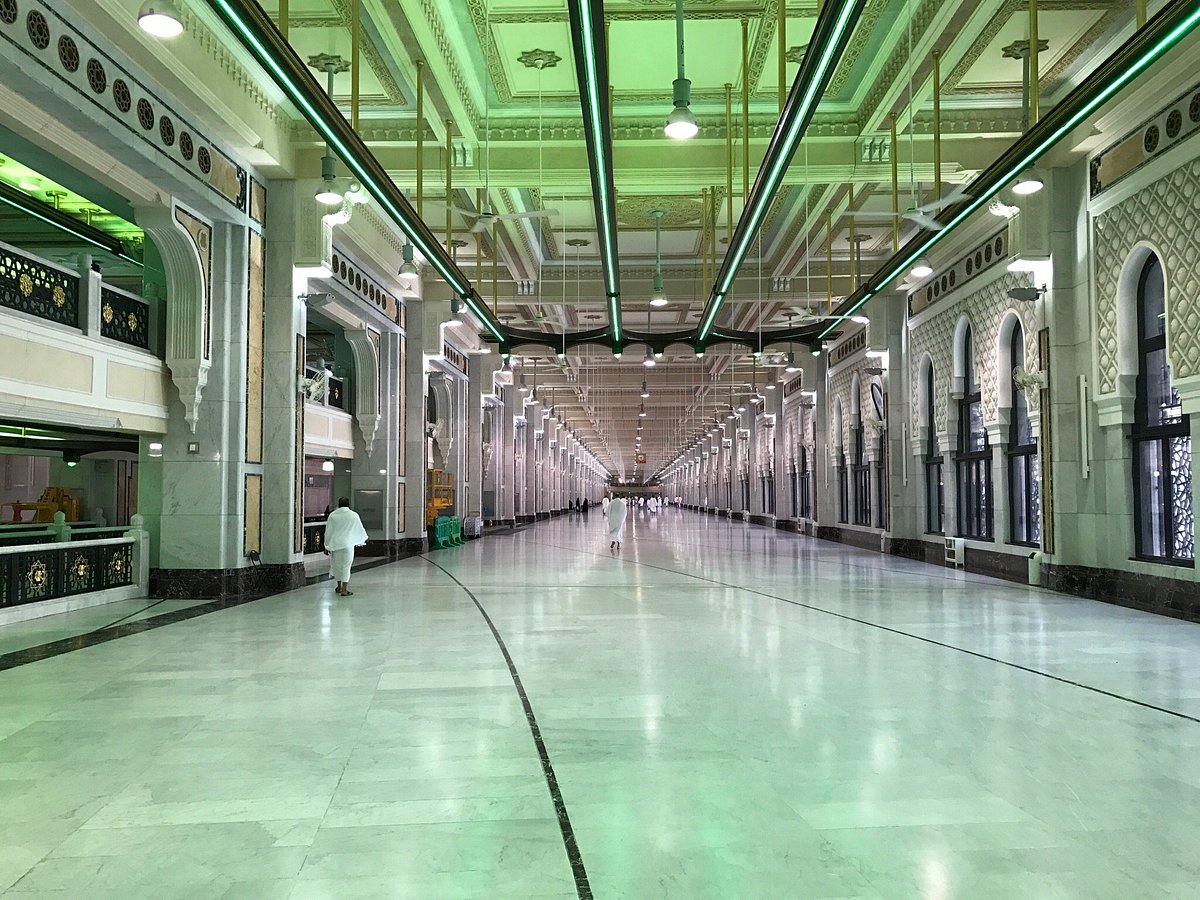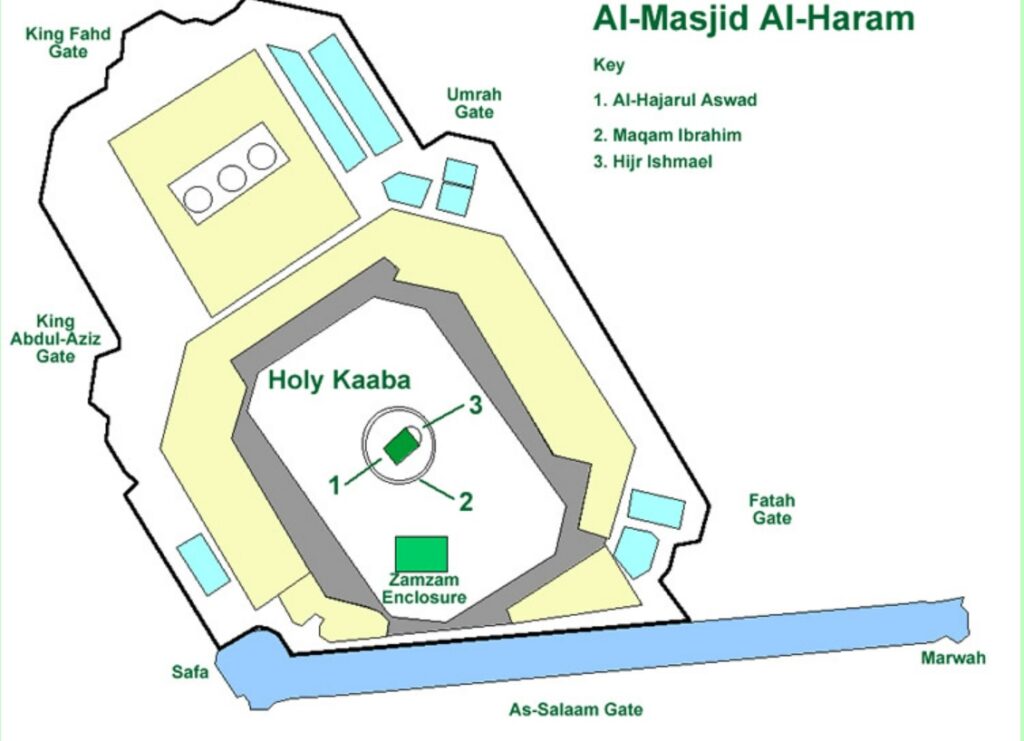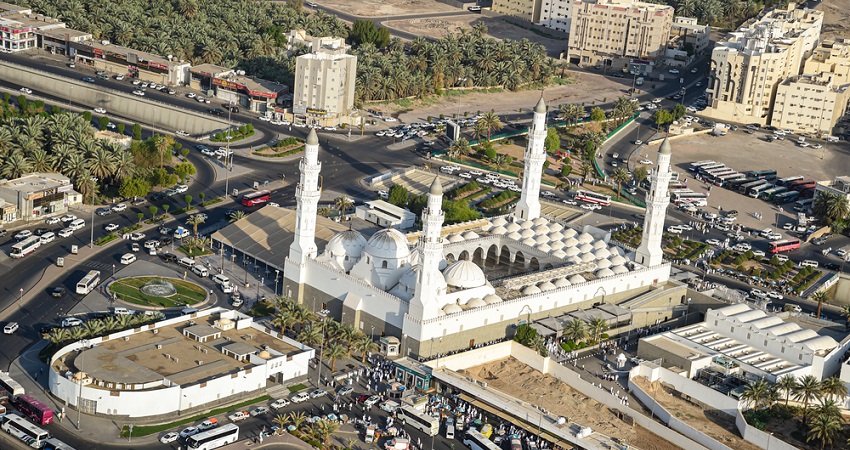بسم الله الرحمن الرحيم
Assalamu Alaikum.
(Here are Parts 1, 2, 3, 4, 5, 6 and 7.)
We are half way through Ramadan so why I have decided to publish a post on Hajj, you may ask?
Actually, this post is about the last part of Umrah, and many people do Umrah in Ramadan due to the great virtues attached to it. Also, for those doing Hajj, Ramadan and itikaf are great preparations for Hajj.
We need to remember that worship doesn’t end in Ramadan. There is something beyond that – the rest of our lives! Ultimately, the purpose of all acts of worship is the same: to get closer to Allah.
So, I decided to break with tradition and publish this post in Ramadan.
In the previous part, we covered Tawaf in great detail. This part covers the rest of Umrah i.e. saee and trimming/shaving one’s hair and exiting ihram.
In the Hadeeth of Jaabir (mentioned in Part 4), it states:
ثُمَّ خَرَجَ مِنَ الْبَابِ إِلَى الصَّفَا. فَلَمَّا دَنَا مِنَ الصَّفَا قَرَأَ: {إِنَّ الصَّفَا وَالْمَرْوَةَ مِنْ شَعَائِرِ اللّهِ} أَبْدَأُ بِمَا بَدَأَ اللّهُ بِهِ, فَبَدَأَ بِالصَّفَا. فَرَقِيَ عَلَيْهِ. حَتَّى رَأَى الْبَيْتَ فَاسْتَقْبَلَ الْقِبْلَةَ. فَوَحَّدَ اللّهَ، وَكَبَّرَهُ. وَقالَ: لاَ إِلهَ إِلاَّ اللّهُ وَحْدَهُ لاَ شَرِيكَ لَهُ. لَهُ الْمُلْكَ وَلَهُ الْحَمْدُ وَهُوَ عَلَى كُلِّ شَيْءٍ قَدِيرٌ. لاَ إِلهَ إِلاَّ اللّهُ وَحْدَهُ. أَنْجَزَ وَعْدَهُ. وَنَصَرَ عَبْدَهُ. وَهَزَمَ الأَحْزَابَ وَحْدَهُ. ثُمَّ دَعَا بَيْنَ ذَلِكَ. قَالَ مِثْلَ هَـذَا ثَلاَثَ مَرَّاتٍ. ثُمَّ نَزَلَ إِلَى الْمَرْوَةِ. حَتَّى إِذَا انْصَبَّتْ قَدَمَاهُ فِي بَطْنِ الْوَادِي سَعَى. حَتَّى إِذَا صَعِيدَنَا مَشَى. حَتَّى أَتَى الْمَرْوَةَ. فَفَعَلَ عَلَى الْمَرْوَةِ كَمَا فَعَلَ عَلَى الصَّفَا. حَتَّى إِذَا كَانَ آخِرُ طَوَافِهِ عَلَى الْمَرْوَةِ فَقَالَ: لَوْ أَنِّي اسْتَقْبَلْتُ مِنْ أَمْرِي مَا اسْتَدْبَرْتُ لَمْ أَسُقِ الْهَدْيَ. وَجَعَلْتُهَا عُمْرَةً. فَمَنْ كَانَ مِنْكُمْ لَيْسَ مَعَهُ هَدْيٌ فَلْيَحِلَّ. وَلْيَجْعَلْهَا عُمْرَةً. فَقَامَ سُرَاقَةُ بْنُ مَالِكِ بْنِ جُعْشُمٍ.فَقَالَ: يَا رَسُولَ اللّهِ أَلِعَامِنا هذَا أَمْ لأَبَدٍ؟ فَشَبَّكَ رَسُولُ اللّهِ أَصَابِعَهُ وَاحِدَةً فِي الأُخْرَى. وَقَالَ: دَخَلَتِ الْعُمْرَةُ فِي الْحَجِّ. مَرَّتَيْنِ .لاَ بَلْ لأَبَدٍ أَبَدٍ
He then went out of the gate to Safa and as he reached near it he recited:
إِنَّ الصَّفَا وَالْمَرْوَةَ مِن شَعَائِرِ اللَّـهِ
Verily, Al-Safa and al-Marwa are among the signs appointed by Allah. [Surah Al-Baqarah (2) : 158]
(adding:) I begin with what Allah began with. He first mounted Safa until he saw the House, and facing Qibla he declared the Oneness of Allah and glorified Him, and said:”There is none worthy of worship except Allah alone, there is no partner with Him. His is the Sovereignty, to Him praise is due, and He is Powerful over everything. There is none worthy of worship except Allah alone, Who fulfilled His promise, helped His servant and defeated the confederates alone.” He then made supplication in the course of that saying such words three times. He then descended and walked towards Marwah, and when his feet came down in the bottom of the valley, he ran, and when he began to ascend he walked till he reached Marwah. There he did as he had done at Safa. And when it was his last running at Marwah he said: If I had known beforehand what I have come to know afterwards, I would not have brought sacrificial animals and would have performed an Umrah. So, he who among you has not the sacrificial animals with him should put off ihram and treat it as an Umrah. Suraqah ibn Malik ibn Jusham (radiallahu anhu) got up and said: O Messenger of Allah, does it apply to the present year, or does it apply forever? Thereupon the Messenger of Allah (sallallahu alaihi wasallam) intertwined the fingers (of one hand) into another and said twice: The Umrah has become incorporated in the Hajj (adding):” No, but for ever and ever.” [Sahih Muslim, Hadeeth No. 2803]
This part will be the last on the rites of Umrah, alhamdulillah. The subsequent parts will focus on the rites of Hajj. The series will end with a look at Madinah and Masjid An-Nabawi as well as Masjid Al-Aqsa, in shaa Allah.
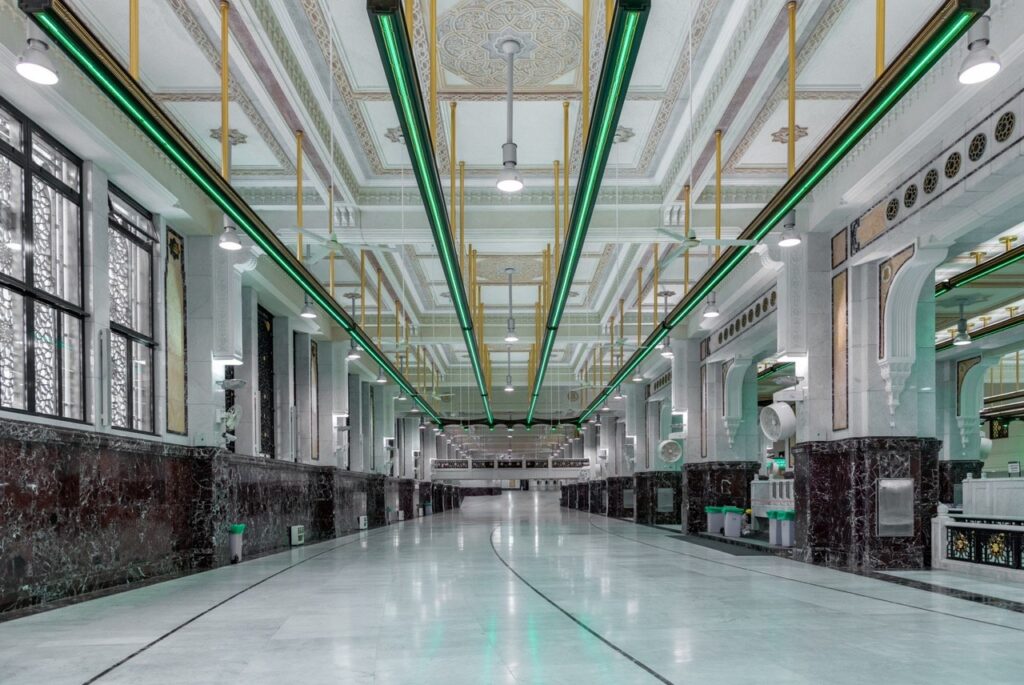
IMPORTANCE AND VIRTUES OF SAEE
Saee is a great act of worship with the following virtues:
1. Allah has ordained saee upon us
عن حبيبة بنت أبي تجراة قالت :قال النبي صلى الله عليه وسلم: اسْعَوُا ،فإِنَّ اللهَ قدْ كَتَبَ عليْكمْ السَّعْيَ
Habeebah bint Abee Tijaarah (radiallahu anha) narrated that the Prophet (sallallahu alaihi wasallam) said: “Do saee because Allah has ordained saee upon you.” [Sahih Al-Jaami, Hadeeth No. 968]
This is enough reason to do saee i.e. simply because Allah has ordered us to do saee.
2. Hajj or Umrah is incomplete without saee
عَنْ هِشَامِ بْنِ عُرْوَةَ، عَنْ أَبِيهِ، أَنَّهُ قَالَ قُلْتُ لِعَائِشَةَ ـ رضى الله عنها ـ زَوْجِ النَّبِيِّ صلى الله عليه وسلم وَأَنَا يَوْمَئِذٍ حَدِيثُ السِّنِّ أَرَأَيْتِ قَوْلَ اللَّهِ تَبَارَكَ وَتَعَالَى {إِنَّ الصَّفَا وَالْمَرْوَةَ مِنْ شَعَائِرِ اللَّهِ فَمَنْ حَجَّ الْبَيْتَ أَوِ اعْتَمَرَ فَلاَ جُنَاحَ عَلَيْهِ أَنْ يَطَّوَّفَ بِهِمَا} فَلاَ أُرَى عَلَى أَحَدٍ شَيْئًا أَنْ لاَ يَطَّوَّفَ بِهِمَا. فَقَالَتْ عَائِشَةُ كَلاَّ، لَوْ كَانَتْ كَمَا تَقُولُ كَانَتْ فَلاَ جُنَاحَ عَلَيْهِ أَنْ لاَ يَطَّوَّفَ بِهِمَا. إِنَّمَا أُنْزِلَتْ هَذِهِ الآيَةُ فِي الأَنْصَارِ كَانُوا يُهِلُّونَ لِمَنَاةَ، وَكَانَتْ مَنَاةُ حَذْوَ قُدَيْدٍ، وَكَانُوا يَتَحَرَّجُونَ أَنْ يَطُوفُوا بَيْنَ الصَّفَا وَالْمَرْوَةِ، فَلَمَّا جَاءَ الإِسْلاَمُ سَأَلُوا رَسُولَ اللَّهِ صلى الله عليه وسلم عَنْ ذَلِكَ، فَأَنْزَلَ اللَّهُ تَعَالَى {إِنَّ الصَّفَا وَالْمَرْوَةَ مِنْ شَعَائِرِ اللَّهِ فَمَنْ حَجَّ الْبَيْتَ أَوِ اعْتَمَرَ فَلاَ جُنَاحَ عَلَيْهِ أَنْ يَطَّوَّفَ بِهِمَا}. زَادَ سُفْيَانُ وَأَبُو مُعَاوِيَةَ عَنْ هِشَامٍ مَا أَتَمَّ اللَّهُ حَجَّ امْرِئٍ وَلاَ عُمْرَتَهُ لَمْ يَطُفْ بَيْنَ الصَّفَا وَالْمَرْوَةِ
Narrated Hisham Ibn Urwah from his father* who said: While I was a youngster, I asked Aishah (radiallahu anha), the wife of the Prophet (sallallahu alaihi wasallam): “What about the meaning of the Statement of Allah:
إِنَّ الصَّفَا وَالْمَرْوَةَ مِن شَعَائِرِ اللَّهِ ۖ فَمَنْ حَجَّ الْبَيْتَ أَوِ اعْتَمَرَ فَلَا جُنَاحَ عَلَيْهِ أَن يَطَّوَّفَ بِهِمَا
Verily! As-Safa and Al-Marwah (two mountains in Makkah) are of the Symbols of Allah. So it is not a sin on him who perform Hajj or Umrah (pilgrimage) of the House (the Kabah at Makkah) to perform the going (Tawaf) between them (As-Safa and Al-Marwah). [Surah Al-Baqarah (2) : 158]
I understand (from that) that there is no harm if somebody does not perform the Tawaf between them.” Aishah replied, “No, for if it were as you are saying, then the recitation would have been like this: ‘It is not harmful not to perform Tawaf between them.’ This verse was revealed in connection with the Ansar who used to assume the Ihram for the idol Manat which was put beside a place called Qudaid and those people thought it not right to perform the Tawaf of As-Safa and Al-Marwah. When Islam came, they asked Allah’s Messenger (sallallahu alaihi wasallam) about that, and Allah revealed:
إِنَّ الصَّفَا وَالْمَرْوَةَ مِن شَعَائِرِ اللَّهِ ۖ فَمَنْ حَجَّ الْبَيْتَ أَوِ اعْتَمَرَ فَلَا جُنَاحَ عَلَيْهِ أَن يَطَّوَّفَ بِهِمَا
Verily! As-Safa and Al-Marwah (two mountains in Makkah) are of the Symbols of Allah. So it is not a sin on him who perform Hajj or Umrah (pilgrimage) of the House (the Kabah at Makkah) to perform the going (Tawaf) between them (As-Safa and Al-Marwah). [Surah Al-Baqarah (2) : 158]
Sufyan and Abu Muawiyah added from Hisham (from Aishah): “The Hajj or Umrah of the person who does not perform the going (Tawaf) between As-Safa and Al-Marwah is incomplete in Allah’s sight. [Sahih Al-Bukhari, Volume 3, Hadeeth No. 18]
[*Urwah ibn Zubair was the son of Az-Zubair ibn Awwam (radiallahu anhu) and Asma bint Abee Bakr (radiallahu anha), the (paternal) sister of Aisha (radiallahu anha).]
Please note that in the above hadeeth, saee has been referred to as tawaf between As-Safa and Al-Marwah.
3. The two mountains As-Safa and Al-Marwah are from amongst the signs of Allah
The two mountains between which saee is performed are from amongst the signs of Allah.
إِنَّ الصَّفَا وَالْمَرْوَةَ مِن شَعَائِرِ اللَّهِ ۖ فَمَنْ حَجَّ الْبَيْتَ أَوِ اعْتَمَرَ فَلَا جُنَاحَ عَلَيْهِ أَن يَطَّوَّفَ بِهِمَا ۚ وَمَن تَطَوَّعَ خَيْرًا فَإِنَّ اللَّهَ شَاكِرٌ عَلِيمٌ
Verily! As-Safa and Al-Marwah (two mountains in Makkah) are of the Symbols of Allah. So it is not a sin on him who perform Hajj or Umrah (pilgrimage) of the House (the Kabah at Makkah) to perform the going (Tawaf) between them (As-Safa and Al-Marwah). And whoever does good voluntarily, then verily, Allah is All-Recogniser, All-Knower. [Surah Al-Baqarah (2) : 158]
4. Performing saee is like freeing 70 slaves
عن ابن عمر رضي الله عنه قال: كنتُ جالسًا مع النَّبيِّ صلَّى اللهُ عليه وسلَّم في مسجدِ منًى فأتاه رجلٌ من الأنصارِ ورجلٌ من ثَقيفٍ فسلَّما ثمَّ قالا يا رسولَ اللهِ جِئنا نسألُك فقال إن شئتُما أخبرَتُكما بما جِئتما تسألاني عنه فعلتُ وإن شِئتُما أن أمسِكَ وتسألاني فعلتُ فقال أخبرنا يا رسولَ اللهِ فقال الثَّقفيُّ للأنصاريِّ سلْ فقال أخبِرْني يا رسولَ اللهِ فقال جِئتَني تسألُني عن مخرجِك من بيتِك تؤُمُّ البيتَ الحرامَ وما لك فيه وعن ركعتَيْك بعد الطَّوافِ وما لك فيهما وعن طوافِك بين الصَّفا والمروةِ وما لك فيه وعن وقوفِك عشيَّةَ عرفةَ وما لك فيه وعن رميِك الجِمارِ وما لك فيه وعن نحرِك فيه وما لك فيه مع الإفاضةِ فقال والَّذي بعثك بالحقِّ لَعَنْ هذا جئتُ أسألُك قال فإنَّك إذا خرجتَ من بيتِك تؤُمُّ البيتَ الحرامَ لا تضعُ ناقتُك خفًّا ولا ترفعُه إلَّا كتب اللهُ لك به حسنةً ومحا عنك خطيئةً وأمَّا ركعتاك بعد الطَّوافِ كعِتقِ رقبةٍ وأمَّا وقوفُك عشيَّةَ عرفةَ فإنَّ اللهَ يهبِطُ إلى سماءِ الدُّنيا فيباهي بكم الملائكةَ يقولُ عبادي جاءوني شُعثًا من كلِّ فجٍّ عميقٍ يرجُون جنَّتي فلو كانت ذنوبُكم كعددِ الرَّملِ أو كقطْرِ المطرِ أو كزَبَدِ البحرِ لغفرتُها أفيضوا عبادي مغفورًا لكم ولمن شفعتُم له وأمَّا رميُك الجمارَ فلك بكلِّ حصاةٍ رميْتَها تُكفِّرُ كبيرةً من الموبقاتِ وأمَّا نحرُك فمذخورٌ لك عند ربِّك وأمَّا حِلاقُك رأسَك فلك بكلِّ شعرةٍ حلقتَها حسنةٌ ويُمحَى عنك بها خطيئةٌ وأمَّا طوافُك بالبيتِ بعد ذلك فإنَّك تطوفُ ولا ذنبَ لك ويأتي ملَكٌ حتَّى يضعَ يدَيْه بين كتِفَيْك فيقولُ اعملْ فيما تستقبِلُ فقد غُفِر لك ما مضَى
It is narrated on the authority of Ibn Umar – radiAllaahu anhuma – who said: I was sitting with the Prophet – sallAllaahu alayhi wa sallam – in the masjid in Mina when a man from the Ansaar came and a man from the Thaqeef, they gave Salaam and said, “O Messenger of Allaah, we came to ask you questions.”
So the Messenger said: “If you want I can inform you why you came and what you want to ask, and I will do so, and if you want I will hold back and you can ask me and I will answer you.”
They said: “Tell us O Messenger of Allaah!”
The man from Thaqeef said to the Ansaari: “Ask.” So the Ansaari man said: “Inform me O Messenger of Allaah!”
The Messenger of Allaah said: “You came to me, to ask about leaving your house and aiming for the Bait-ul-Haraam and the reward for it; about praying two Rakah after Tawaaf and the reward for it; going between as-Safa and Marwa and the reward for it; your staying the evening in Mina, and the reward for it; stoning the Jamarah and the reward for it; slaughtering an animal and the reward for it; and the Tawaaf of al-Ifaadhah.” The man said: “I swear by the One who sent you with the truth! This is what I came to ask you about.”
The Prophet said: “As for you leaving your homes aiming for the Bait-ul-Haraam: then your she-camel does not place its foot nor does it raise it except that Allaah writes for you a reward due to it, and wipes off one of your sins.
As for the two Rakah after the Tawaaf, then it is equivalent to freeing a slave from the Children of Ismaeel. As for your circuiting of as-Safa and al-Marwa, then it is the same as freeing 70 slaves.
As for you staying till the evening in Arafah, then Allaah descends to the sky of the Duniya* and He boasts about you to the Angels, and says: ‘My slaves have come to Me, looking rough, from every deep valley hoping for My mercy, so if your sins were equivalent to the amount of sand or the drops of rain or like the foam on the sea I will forgive them. So go forth My slaves! Having forgiveness and for what or who you have interceded for.’
As for stoning the Jamaar (the pillars), then for every stone that you throw, it removes a big sin from the deadly sins. As for your slaughtering, then it is saved for you with your Lord. As for shaving your head, then there is a reward for every strand of hair that you shaved, and a sin is wiped off by it.
As for you performing Tawaaf of the House after all this, then by this time your are performing Tawaaf with no sin upon you and an Angel comes and places his hand between your shoulders saying: “Perform good deeds in what you face of the future for verily your past sins have been forgiven.” [Sahih At-Targheeb Wat-Tarheeb, Hadeeth No. 1112]
[* Duniya is this world.]
[ Note: As mentioned in the previous parts, this hadeeth was translated by Brother Abbas Abu Yahya on his blog, so I decided to copy as it is and not make any changes to the translation. ]
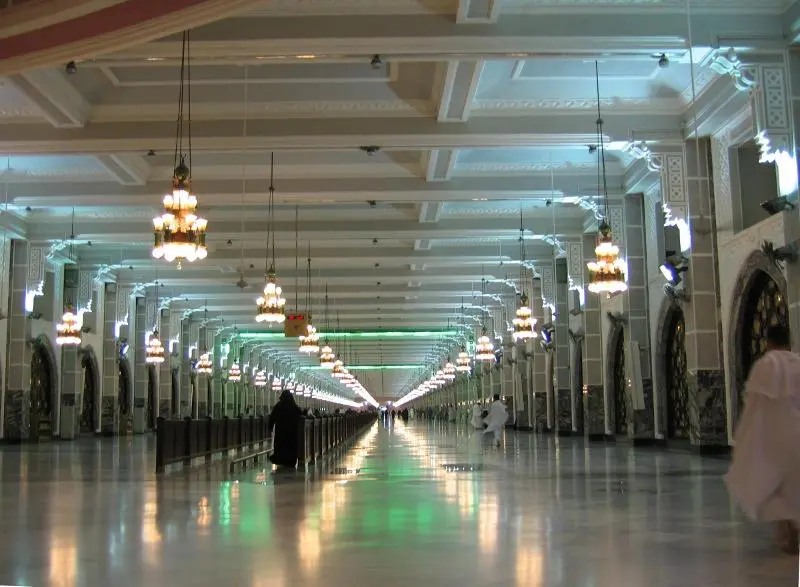
HISTORY OF SAEE
The history of Saee starts with the story of Haajar (radiallahu anha), the wife of Ibrahim (alaihissalaam).
عن سعيدِ بن جُبَيرٍ قال ابن عبّاسٍ : أول ما اتخذَ النساءُ المِنطَقَ من قِبَلِ أمِّ إِسماعيلَ اتَّخذتْ مِنْطقاً لتُعفِّيَ أثرَها على سارة، ثم جاء بها إبراهيمُ وبابِنها إسماعيلَ وهيَ تُرضِعُهُ، حتى وَضعَها عندَ البيتِ عند دَوحةٍ فوقَ زَمزَم في أعلى المسجدِ، وليسَ بمكةَ يَومَئذٍ أحد، وليس بها ماءٌ فوَضعَهما هنالك، ووضعَ عندَهما جِراباً فيهِ تمرٌ وسِقاءً فيهِ ماءٌ، ثم قَفَّى إِبراهيمُ مُنَطلِقاً، فتَبِعَتْهُ أمُّ إِسماعيلَ فقالت: يا إِبراهيمُ أينَ تَذهَبُ وتترُكنا بهذا الوادي الذي ليس فيه إِنسٌ ولا شيء، فقالت له ذلكَ مِراراً، وجعلَ لا يَلتفِتُ إِليها. فقالت له: آلله أمرَكَ بهذا ؟ قال: نعم. قالت: إذَن لا يُضيِّعُنا. ثمَّ رَجعتْ. فانطَلَقَ إِبراهيمُ حتى إذا كان عندَ الثَّنيَّةِ حيثُ لا يَرونَهُ استقبَلَ بوَجههِ البيتَ ثمَّ دَعا بهؤلاءِ الكلماتِ ورَفعَ يَدَيهِ فقال: {ربَّنا إِني أسكَنتُ من ذُرِّيَّتي بوادٍ غير ذي زرع ـ حتى بلغ ـ يَشكُرون} (إبراهيم: 37). وجَعَلت أمُّ إِسماعيلَ تُرضِعُ إِسماعيلَ وتَشربُ من ذلك الماء، حتى إِذا نَفِذَ ما في السِّقاءِ عَطِشَت وعطِش ابنُها، وجعَلَت تَنظُرُ إِليه يَتلوَّى ـ أو قال: يَتلبَّط ـ فانطَلَقَتْ كراهيةَ أن تَنظُرَ إِليه، فوَجدَتِ الصَّفا أقرَبَ جَبلٍ في الأرضِ يَليها، فقامَت عليهِ، ثمَّ استقبَلَتِ الوادِيَ تَنظُرُ هل تَرَى أحداً، فلم تَرَ أحداً، فهبَطَت مِنَ الصَّفا، حتى إِذا بلَغَتِ الواديَ رَفعَت طرَفَ دِرعِها، ثمَّ سَعَت سَعيَ الإنسانِ المجهودِ حتى جاوَزَتِ الواديَ، ثمَّ أتَتِ المرْوَةَ فقامت عليها فنظَرَت هل تَرَى أحداً، فلم تَرَ أحداً، ففعلت ذلك سبعَ مراتٍ. قال ابنُ عباسٍ قال النبيُّ: فذلك سعيُ الناسِ بينهما. فلماأشرَفَت على المروةِ سمعَت صوتاً فقالت: صَهٍ ـ تريدُ نفسَها ـ ثمَّ تسمَّعَتْ أيضاً فقالت: قد أسمعتَ إن كان عندَكَ غِواث، فإِذا هيَ بالملَكِ عند مَوضعِ زَمزم، فبَحَثَ بعَقِبهِ ـ أو قال بجَناحهِ ـ حتى ظهرَ الماءُ، فجعَلَت تَحُوضهُ وتقول بيدِها هكذا، وجَعلت تَغرِفُ منَ الماءِ في سِقائها وهوَ يَفورُ بعدما تَغرِفُ. قال ابنُ عباسٍ قال النبيُّ صلى الله عليه وسلّم: يَرحَمُ الله أمَّ إسماعيلَ لو تَرَكَت زمزَم ـ أو قال: لو لم تَغرِف منَ الماء ـ لكانت زمزمُ عَيناً مَعيناً. قال: فشَرِبتَ وأرضَعتْ ولَدَها، فقال لها الملَكُ: لا تخافوا الضَّيعة، فإِنَّ ها هنا بيتَ الله يَبني هذا الغلامُ وأبوه، وإنَّ الله لا يُضيعُ أهلَه. وكان البيتُ مرتفعاً منَ الأرضِ كالرابية، تأتيهِ السيولُ فتأخُذ عن يمينهِ وشمالهِ، فكانت كذلكَ حتى مرَّت بهم رُفقة من جُرْهُم ـ أو أهلُ بيتٍ من جُرْهُم ـ مُقبِلينَ من طريقِ كَداء، فنزَلوا في أسفَلِ مكةَ، فَرأوا طائراً عائفاً، فقالوا: إِنَّ هذا الطائر لَيَدورُ على ماء، لَعهدُنا بهذا الوادي وما فيه ماء، فأرسَلوا جَريّاً أو جَرِيَّينِ فإِذا هم بالماء، فرَجَعوا فأخبروهم بالماءِ، فأقبلوا ـ قال وأمُّ إسماعيلَ عند الماء ـ فقالوا: أتأذَنينَ لنا أن نَنزِلَ عندَكِ ؟ فقالت: نعم، ولكنْ لا حقَّ لكم في الماء. قالوا: نعم. قال ابنُ عباسٍ قال النبيُّ صلى الله عليه وسلّم. فألفى ذلكَ أمَّ إِسماعيلَ وهيَ تحبُّ الإِنسَ، فنزَلوا، وأرسلوا إلى أهلِيهم فنزلوا معهم، حتى إِذا كان بها أهلُ أبياتٍ منهم، وشبَّ الغلامُ وتعلَّمَ العربيةَ منهم، وأنفَسَهُم وأعجبَهم حينَ شَبَّ، فلما أدركَ زوَّجوهُ امرأة منهم
Said ibn Jubair narrated: Ibn Abbas (radiallahu anhuma) said: The first lady to use a girdle was the mother of Ismail (i.e. Haajar). She used a girdle so that she might hide her tracks from Sarah. Ibrahim brought her and her son Ismail while she was suckling him, to a place near the Kabah under a tree on the spot of Zam-Zam, at the highest place in the mosque. During those days there was nobody in Makkah, nor was there any water. So he made them sit over there and placed near them a leather bag containing some dates, and a small water-skin containing some water, and set out homeward. Ismail’s mother followed him saying, “O Ibrahim! Where are you going, leaving us in this valley where there is no person whose company we may enjoy, nor is there anything (to enjoy)?” She repeated that to him many times, but he did not look back at her. Then she asked him, “Has Allah ordered you to do so?” He said, “Yes.” She said, “Then He will not neglect us,” and returned while Ibrahim proceeded onwards, and on reaching the Thaniya where they could not see him, he faced the Kabah, and raising both hands, invoked Allah saying the following prayers:
رَّبَّنَا إِنِّي أَسْكَنتُ مِن ذُرِّيَّتِي بِوَادٍ غَيْرِ ذِي زَرْعٍ عِندَ بَيْتِكَ الْمُحَرَّمِ رَبَّنَا لِيُقِيمُوا الصَّلَاةَ فَاجْعَلْ أَفْئِدَةً مِّنَ النَّاسِ تَهْوِي إِلَيْهِمْ وَارْزُقْهُم مِّنَ الثَّمَرَاتِ لَعَلَّهُمْ يَشْكُرُونَ
“O our Lord! I have made some of my offspring to dwell in an uncultivable valley by Your Sacred House (the Kabah at Makkah); in order, O our Lord, that they may perform salah (prayer), so fill some hearts among men with love towards them, and (O Allah) provide them with fruits so that they may give thanks.” [Surah Ibrahim (14) : 37]
Ismail’s mother went on suckling Ismail and drinking from the water (she had). When the water in the water-skin had all been used up, she became thirsty and her child also became thirsty. She started looking at him (i.e. Ismail) tossing in agony; She left him, for she could not endure looking at him, and found that the mountain of Safa was the nearest mountain to her on that land. She stood on it and started looking at the valley keenly so that she might see somebody, but she could not see anybody. Then she descended from Safa and when she reached the valley, she tucked up her robe and ran in the valley like a person in distress and trouble, till she crossed the valley and reached the Marwah mountain where she stood and started looking, expecting to see somebody, but she could not see anybody. She repeated that (running between Safa and Marwah) seven times.” The Prophet (sallallahu alaihi wassalam) said, “This is the source of the tradition of the walking of people between them (i.e. Safa and Marwah).
When she reached the Marwah (for the last time) she heard a voice and she asked herself to be quiet and listened attentively. She heard the voice again and said, ‘O, (whoever you may be)! You have made me hear your voice; have you got something to help me?” And behold! She saw an angel at the place of Zam-Zam, digging the earth with his heel (or his wing), till water flowed from that place. She started to make something like a basin around it, using her hand in this way, and started filling her water-skin with water with her hands, and the water was flowing out after she had scooped some of it.”
The Prophet (sallallahu alaihi wasallam) added, “May Allah bestow Mercy on Ismail’s mother! Had she let the Zam-Zam (flow without trying to control it) (or had she not scooped from that water) (to fill her water-skin), Zam-Zam would have been a stream flowing on the surface of the earth.” The Prophet (sallallahu alaihi wasallam) further added, “Then she drank (water) and suckled her child. The angel said to her, ‘Don’t be afraid of being neglected, for this is the House of Allah which will be built by this boy and his father, and Allah never neglects His people.’ The House (i.e. Kabah) at that time was on a high place resembling a hillock, and when torrents came, they flowed to its right and left. She lived in that way till some people from the tribe of Jurhum or a family from Jurhum passed by her and her child, as they (i.e. the Jurhum people) were coming through the way of Kada. They landed in the lower part of Makkah where they saw a bird that had the habit of flying around water and not leaving it. They said, ‘This bird must be flying around water, though we know that there is no water in this valley.’ They sent one or two messengers who discovered the source of water, and returned to inform them of the water. So, they all came (towards the water).” The Prophet (sallallahu alaihi wasallam) added, “Ismail’s mother was sitting near the water. They asked her, ‘Do you allow us to stay with you?” She replied, ‘Yes, but you will have no right to possess the water.’ They agreed to that.” The Prophet (sallallahu alaihi wasallam) further said, “Ismail’s mother was pleased with the whole situation as she used to love to enjoy the company of the people. So, they settled there, and later on they sent for their families who came and settled with them so that some families became permanent residents there. The child (i.e. Ismail) grew up and learnt Arabic from them and (his virtues) caused them to love and admire him as he grew up, and when he reached the age of puberty they made him marry a woman from amongst them.
[Sahih Al-Bukhari, Volume 4, Hadeeth No. 583. The entire hadeeth has already been mentioned in Part 3.]
Haajar (radiallahu anhu) was simply searching for water to drink so that she could then feed her baby but, subhan Allah, the path she walked became a part of Hajj and Umrah.
Ironically enough, when I performed Hajj in 2003, they had removed all the water cans in the saee region so that there was enough place for the people to do saee. Whilst doing saee, I got really thirsty and looked for water. There was a lady pouring some water for people and she gave me half a cup, may Allah reward her greatly.
Whilst thirsty, I motivated myself to continue saee by reminding myself that Haajar had also done this. I still remember how difficult that saee was. I cannot imagine how tough it must have been for her to run in the heat between the mountains, alone in the desert and fearful for her child.
Saee was then performed by the Arabs in the pre-Islamic era, as they used to follow aspects from the religion of Ibrahim (alaihissalaam). However, they used to do saee for their idols. So when they became Muslim, they hesitated to do saee until Allah sent down revelation regarding this issue.
عَنْ هِشَامِ بْنِ عُرْوَةَ، عَنْ أَبِيهِ، عَنْ عَائِشَةَ، قَالَ قُلْتُ لَهَا إِنِّي لأَظُنُّ رَجُلاً لَوْ لَمْ يَطُفْ بَيْنَ الصَّفَا وَالْمَرْوَةِ مَا ضَرَّهُ . قَالَتْ لِمَ قُلْتُ لأَنَّ اللَّهَ تَعَالَى يَقُولُ { إِنَّ الصَّفَا وَالْمَرْوَةَ مِنْ شَعَائِرِ اللَّهِ} إِلَى آخِرِ الآيَةِ . فَقَالَتْ مَا أَتَمَّ اللَّهُ حَجَّ امْرِئٍ وَلاَ عُمْرَتَهُ لَمْ يَطُفْ بَيْنَ الصَّفَا وَالْمَرْوَةِ وَلَوْ كَانَ كَمَا تَقُولُ لَكَانَ فَلاَ جُنَاحَ عَلَيْهِ أَنْ لاَ يَطَّوَّفَ بِهِمَا . وَهَلْ تَدْرِي فِيمَا كَانَ ذَاكَ إِنَّمَا كَانَ ذَاكَ أَنَّ الأَنْصَارَ كَانُوا يُهِلُّونَ فِي الْجَاهِلِيَّةِ لِصَنَمَيْنِ عَلَى شَطِّ الْبَحْرِ يُقَالُ لَهُمَا إِسَافٌ وَنَائِلَةٌ . ثُمَّ يَجِيئُونَ فَيَطُوفُونَ بَيْنَ الصَّفَا وَالْمَرْوَةِ ثُمَّ يَحْلِقُونَ . فَلَمَّا جَاءَ الإِسْلاَمُ كَرِهُوا أَنْ يَطُوفُوا بَيْنَهُمَا لِلَّذِي كَانُوا يَصْنَعُونَ فِي الْجَاهِلِيَّةِ قَالَتْ فَأَنْزَلَ اللَّهُ عَزَّ وَجَلَّ { إِنَّ الصَّفَا وَالْمَرْوَةَ مِنْ شَعَائِرِ اللَّهِ} إِلَى آخِرِهَا – قَالَتْ – فَطَافُوا
Hisham ibn Urwah reported on the authority of his father who narrated from Aishah (radiallahu anha). He said to Aishah: I think if a person does not run between as-Safa and al-Marwah, it does not do any harm to him (so far as Hajj is concerned). She said: Why (do you think so)? I said: For Allah says:
إِنَّ الصَّفَا وَالْمَرْوَةَ مِن شَعَائِرِ اللَّـهِ
Verily! As-Safa and Al-Marwah (two mountains in Makkah) are of the Symbols of Allah. [Surah Al-Baqarah (2) : 158] (to the end of the verse),
whereupon she said: Allah does not complete the Hajj of a person or his Umrah if he does not observe Saee between as-Safa and al-Marwah; and if it were so as you state, then (the wording would have been (fala janah an la yatufu biha) [” There is no harm for him if he does not circumambulate between them’]. Do you know in what context (this verse was revealed)? (It was revealed in this context) that the Ansar in the Days of Ignorance pronounced the Talbiya for two idols fixed on the bank of the river which were called Isaf and Naila. The people went there, and then circumambulated between as-Safa and al-Marwah and then got their heads shaved. With the advent of Islam they (the Muslims) did not like to circumambulate between them as they used to do during the Days of Ignorance. It was on account of this that Allah. the Exalted and Majestic, revealed:
إِنَّ الصَّفَا وَالْمَرْوَةَ مِن شَعَائِرِ اللَّـهِ
Verily! As-Safa and Al-Marwah (two mountains in Makkah) are of the Symbols of Allah. [Surah Al-Baqarah (2) : 158] to the end of the verse.
She said: Then people began to observe Saee. [Sahih Muslim, Hadeeth No. 2923]
It seems a group of the Arabs use to refrain from doing saee in the pre-Islamic period though.
عن عُروة سألتُ عائشةَ رضيَ اللّهُ عنها فقلتُ لها: أرأيتِ قولَ اللّهِ تعالى {إنَّ الصَّفا والمَروةَ مِن شَعائرِ اللّهِ، فمن حجَّ البيتَ أو اعتمرَ فلا جُناحَ عليهِ أن يَطَّوَّفَ بهما} (البقرة: 158) فواللّهِ ما على أحدٍ جُنَاح أن لايَطوفَ بالصَّفا والمروةِ. قالت: بئسَ ما قُلْتَ ياابنَ أُختي، إنَّ هذه لو كانت كما أوَّلتَها عليهِ كانت لاجُناحَ عليهِ أن لايَتطوَّفَ بهما، ولكنَّها أُنزِلَت في الأنصارِ، كانوا قبلَ أن يُسْلِموا يُهلُّونَ لِمَناةَ الطاغيةِ التي كانوا يَعبُدونَها عندَ المُشَلَّل، فكانَ مَن أهلَّ يَتحرَّجُ أنَ يطوفَ بالصَّفا والمروة، فلمَّا أسلموا سألوا رسولَ اللّهِ صلى الله عليه وسلّم عن ذلك قالوا: يا رسولَ اللّهِ، إنَّا كُنَّا نَتحرَّجُ أن نَطوفَ بينَ الصفا والمروةِ، فأنزلَ اللّهُ تعالى {إن الصَّفا والمروةَ من شَعائرِ اللّهِ} الآية. قالت عائشةُ رضيَ اللّهُ عنها: وقد سَنَّ رسولُ اللّهِ صلى الله عليه وسلّم الطوافَ بينهما فليسَ لأحدٍ أن يَترُكَ الطوافَ بينهما. ثم أخبَرْتُ أبا بكرِ بنَ عبدِ الرحمنِ فقال: إنَّ هذا لَعِلمٌ ماكنتُ سَمعتهُ، ولقد سمعتُ رجالاً من أهلِ العلمِ يَذكرونَ أنَّ الناسَ ـ إلاّ مَن ذكرَتْ عائشةُ ممَّن كانَ يُهِلُّ بمناةَ ـ كانوا يطوفونَ كلُّهم بالصفا والمروةِ، فلمّا ذكرَ اللّهُ تعالى الطوافَ بالبيتِ ولم يَذكُرِ الصفا والمروةَ في القرآنِ، قالوا: يارسولَ اللّهِ، كنَّا نَطوفُ بالصفا والمروةِ، وإنَّ اللّهَ أنزَل الطوافَ بالبيتِ فلم يذكُرِ الصفا، فهل علينا من حَرَجٍ أن نطَّوَّفُ بالصفا والمروة؟ فأنزلَ اللّهُ تعالى {إنَّ الصَّفا والمروةَ من شعائرِ اللّهِ} الآية. قال أبو بكرٍ: فأسْمَعُ هذهِ الآية نزلَتْ في الفريقَينِ كلَيهما: في الذينَ كانوا يتحرَّجونَ أن يَطوفوا في الجاهليةِ بالصفا والمروةِ، والذين يَطوفونَ ثمَّ تحرَّجوا أن يَطوفوا بهما في الإِسلام من أجلِ أنَّ اللّهَ تعالى أمرَ بالطوافِ بالبيتِ ولم يذْكُرِ الصفا، حتى ذكرَ ذلك بَعْدَ ما ذَكَرَ الطوافَ بالبيتِ
Narrated Urwah: I asked Aishah (radiallahu anha) : “How do you interpret the statement of Allah,
إِنَّ الصَّفَا وَالْمَرْوَةَ مِن شَعَائِرِ اللَّهِ ۖ فَمَنْ حَجَّ الْبَيْتَ أَوِ اعْتَمَرَ فَلَا جُنَاحَ عَلَيْهِ أَن يَطَّوَّفَ بِهِمَا
Verily! As-Safa and Al-Marwah (two mountains in Makkah) are of the Symbols of Allah. So it is not a sin on him who perform Hajj or Umrah (pilgrimage) of the House (the Kabah at Makkah) to perform the going (Tawaf) between them (As-Safa and Al-Marwah). [Surah Al-Baqarah (2) : 158]
By Allah! (it is evident from this revelation) there is no harm if one does not perform Tawaf between Safa and Marwah.” ‘Aisha said, “O, my nephew! Your interpretation is not true. Had this interpretation of yours been correct, the statement of Allah should have been, ‘It is not harmful for him if he does not perform Tawaf between them.’ But in fact, this divine inspiration was revealed concerning the Ansar who used to assume lhram for worshipping an idol called “Manat” which they used to worship at a place called Al-Mushallal before they embraced Islam, and whoever assumed Ihram (for the idol), would consider it not right to perform Tawaf between Safa and Marwa.
When they embraced Islam, they asked Allah’s Messenger (sallallahu alaihi wasallam) regarding it, saying, “O Allah’s Messenger! We used to refrain from Tawaf between Safa and Marwah.” So Allah revealed:
إِنَّ الصَّفَا وَالْمَرْوَةَ مِن شَعَائِرِ اللَّهِ
Verily! As-Safa and Al-Marwah (two mountains in Makkah) are of the Symbols of Allah. [Surah Al-Baqarah (2) : 158]
Aishah added, “Surely, Allah’s Messenger (sallallahu alaihi wasallam) set the tradition of Tawaf between Safa and Marwah, so nobody is allowed to omit the Tawaf between them.”
Later on I (Urwah) told Abu Bakr bin Abdur-Rahman (of Aishah’s narration) and he said, ‘I have not heard of such information, but I heard learned men saying that all the people, except those whom Aishah mentioned and who used to assume lhram for the sake of Manat, used to perform Tawaf between Safa and Marwah.
When Allah referred to the Tawaf of the Kabah and did not mention Safa and Marwa in the Quran, the people asked, ‘O Allah’s Messenger! We used to perform Tawaf between Safa and Marwah and Allah has revealed (the verses concerning) Tawaf of the Kabah and has not mentioned Safa and Marwah. Is there any harm if we perform Tawaf between Safa and Marwah?’ So Allah revealed:
إِنَّ الصَّفَا وَالْمَرْوَةَ مِن شَعَائِرِ اللَّهِ
Verily! As-Safa and Al-Marwah (two mountains in Makkah) are of the Symbols of Allah. [Surah Al-Baqarah (2) : 158]
Abu Bakr said, “It seems that this verse was revealed concerning the two groups, those who used to refrain from Tawaf between Safa and Marwah in the Pre-lslamic Period of ignorance and those who used to perform the Tawaf then, and after embracing Islam they refrained from the Tawaf between them as Allah had enjoined Tawaf of the Kabah and did not mention Tawaf (of Safa and Marwah) till later after mentioning the Tawaf of the Kabah.’ [Sahih Al-Bukhari, Volume 2, Hadeeth No. 706]
عن عَاصِم، قَالَ قُلْتُ لأَنَسِ بْنِ مَالِكٍ ـ رضى الله عنه ـ أَكُنْتُمْ تَكْرَهُونَ السَّعْىَ بَيْنَ الصَّفَا وَالْمَرْوَةِ قَالَ نَعَمْ. لأَنَّهَا كَانَتْ مِنْ شَعَائِرِ الْجَاهِلِيَّةِ، حَتَّى أَنْزَلَ اللَّهُ {إِنَّ الصَّفَا وَالْمَرْوَةَ مِنْ شَعَائِرِ اللَّهِ فَمَنْ حَجَّ الْبَيْتَ أَوِ اعْتَمَرَ فَلاَ جُنَاحَ عَلَيْهِ أَنْ يَطَّوَّفَ بِهِمَا}
Narrated Asim: I asked Anas bin Malik (radiallahu anhu): “Did you use to dislike to perform Tawaf between Safa and Marwah?” He said, “Yes, as it was of the ceremonies of the days of the Pre-Islamic period of ignorance, till Allah revealed:
إِنَّ الصَّفَا وَالْمَرْوَةَ مِن شَعَائِرِ اللَّهِ ۖ فَمَنْ حَجَّ الْبَيْتَ أَوِ اعْتَمَرَ فَلَا جُنَاحَ عَلَيْهِ أَن يَطَّوَّفَ بِهِمَا
Verily! As-Safa and Al-Marwah (two mountains in Makkah) are of the Symbols of Allah. So it is not a sin on him who perform Hajj or Umrah (pilgrimage) of the House (the Kabah at Makkah) to perform the going (Tawaf) between them (As-Safa and Al-Marwah). [Surah Al-Baqarah (2) : 158]
[Sahih Al-Bukhari, Volume 2, Hadeeth No. 710]
This is what the masaa (saee area) looked like in the past:
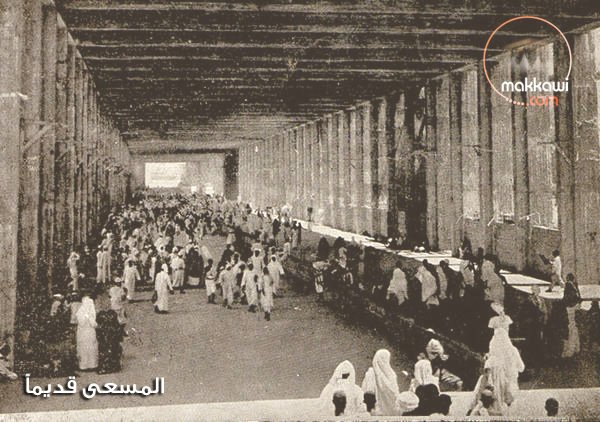

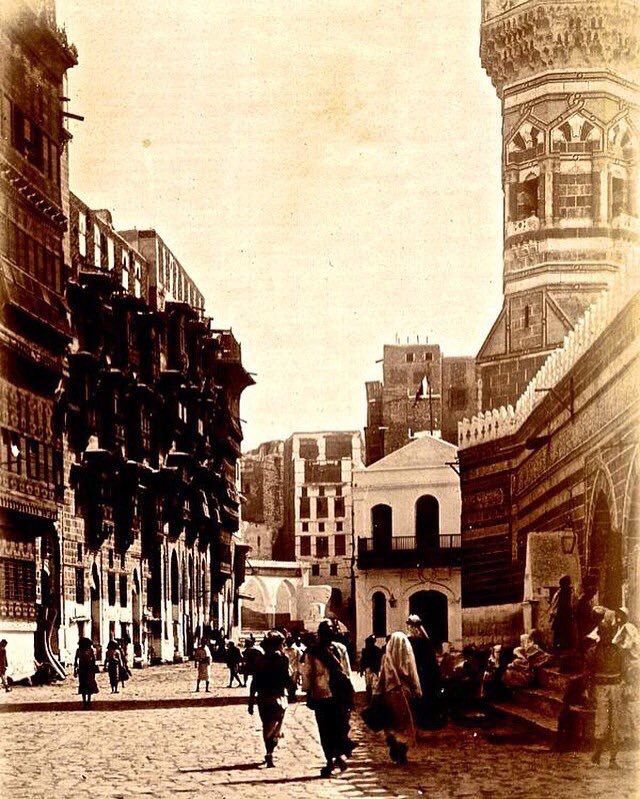
فيديو نادر
— ذاكرة الماضي الجميل (@ksaoldphoto) June 11, 2019
السعي بين الصفا والمروة عام 1346هـ/ 1928م، وكان الملك عبدالعزيز -طيب الله ثراه- قد أمر في ١٩٢٧م بتبليط المسعى بالحجر الصوان المربع منعًا لإثارة الغبار.
يلاحظ أن المسعى كان خارج المسجد إلى أن تم ضمه إلى المسجد في توسعة الملك سعود رحمه الله.#ذاكرة_مكة_المكرمة pic.twitter.com/hzLFcOhZh9


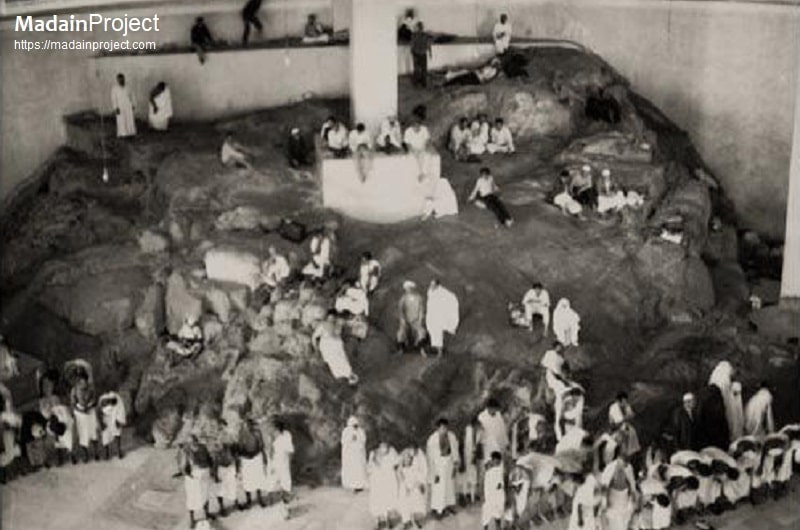
I believe the following was construction taking place to cover the masaa (which used to be open in the past):

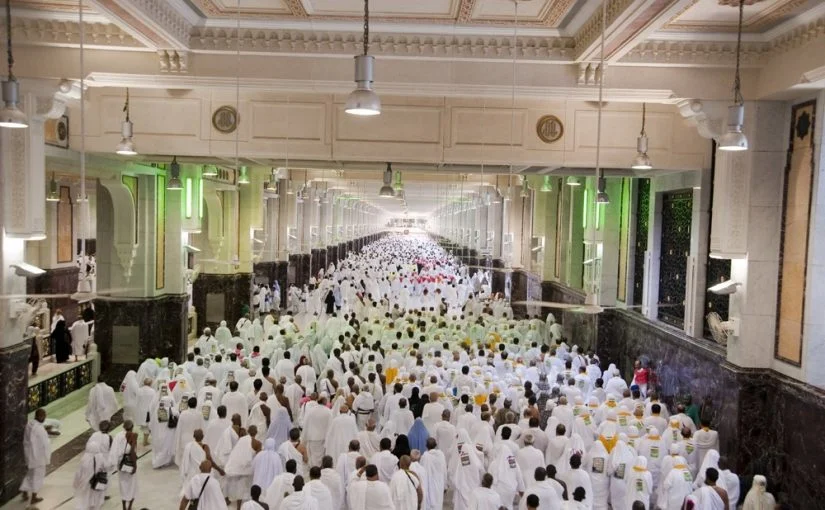
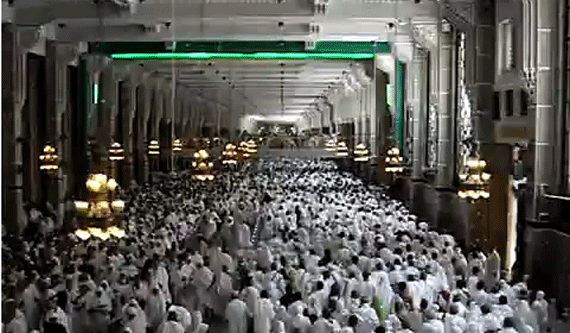
The masaa was expanded a few years ago. This has resulted in a difference of opinion which will be discussed later on in this post, in shaa Allah.
This is what As-Safa looks like in recent times:
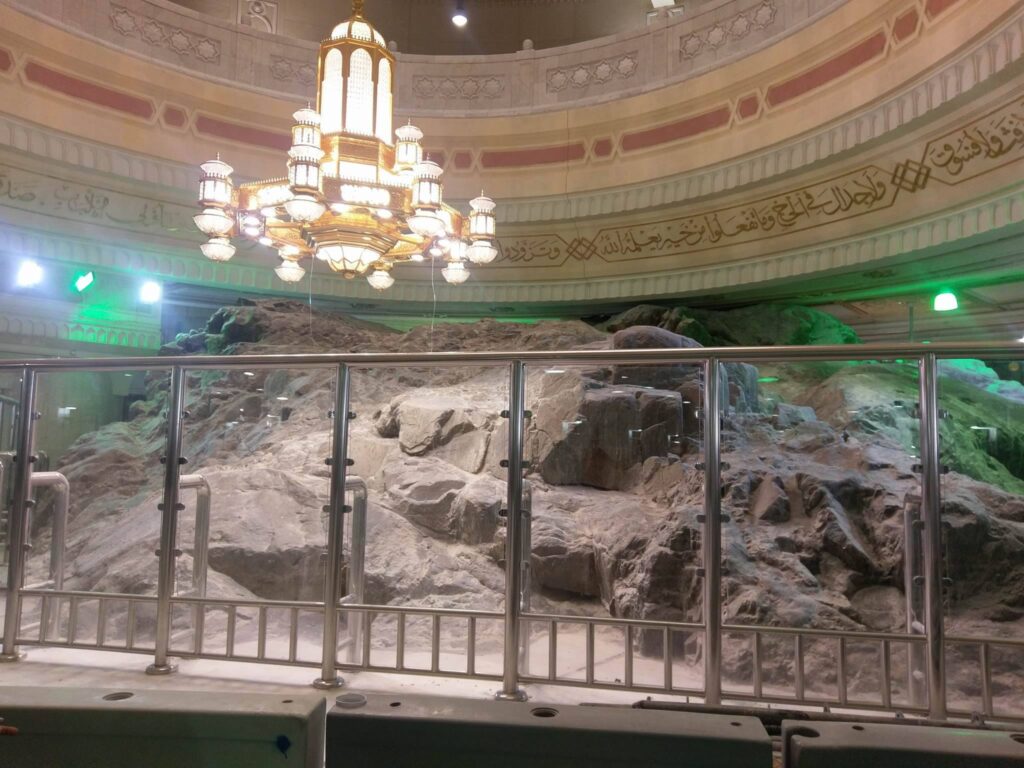
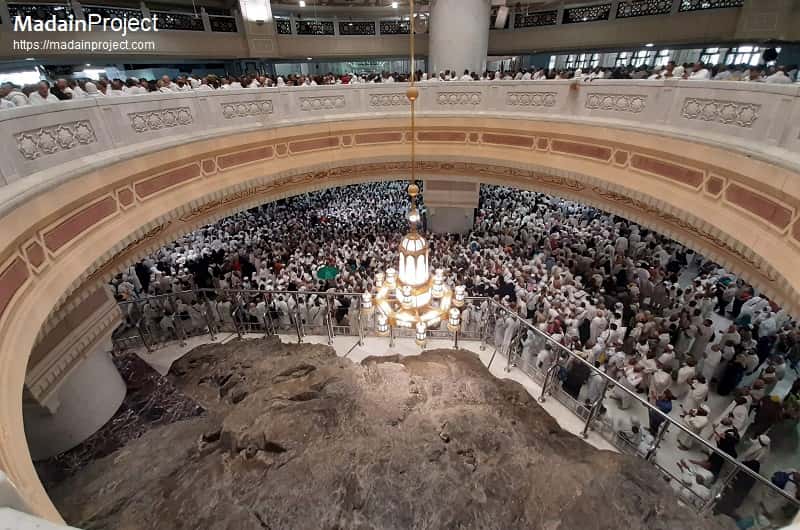
This is what Al-Marwah looks like in recent times:
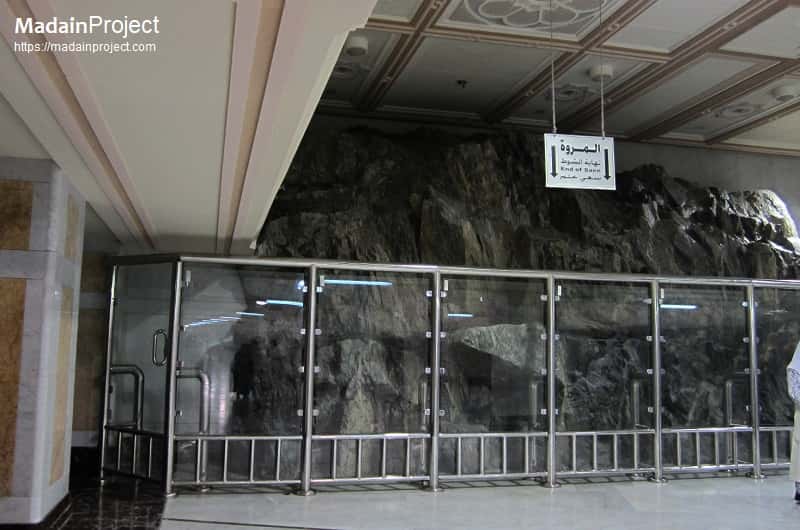
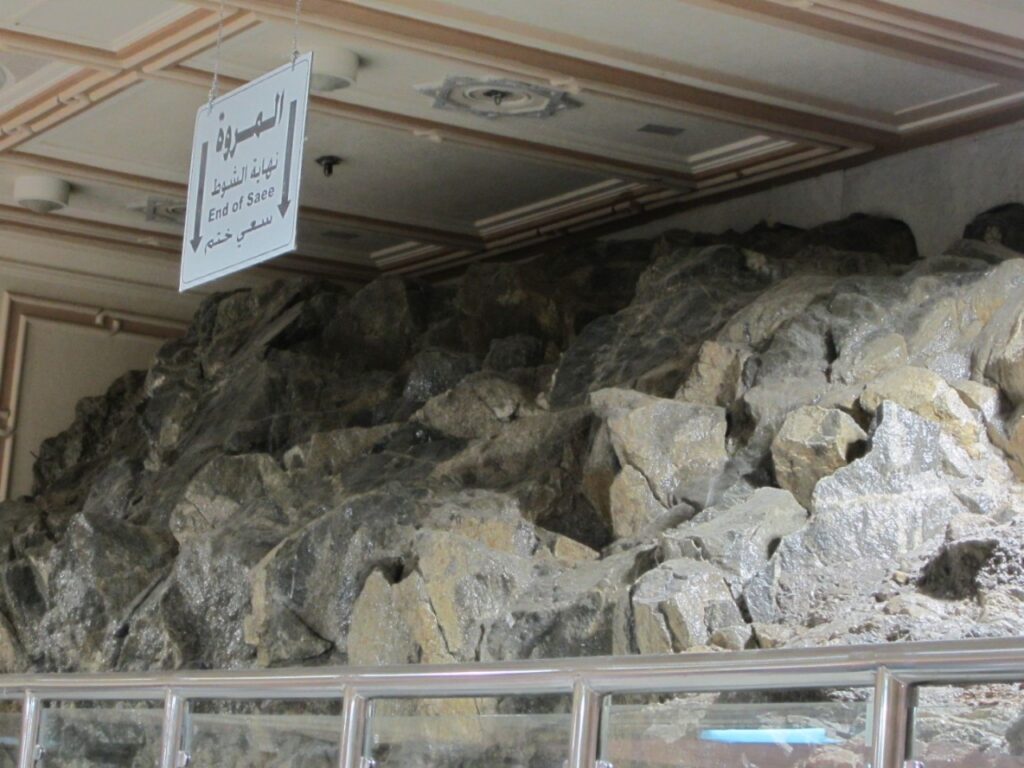
When I went for Hajj in February 2003, there was no enclosure around either mountain and we were able to stand on the top part of both of them. I’m not sure if the enclosure started from the Covid era or if it was present before that. I was told recently that it is still possible to stand on As-Safa but not Al-Marwah. Allah knows Better.
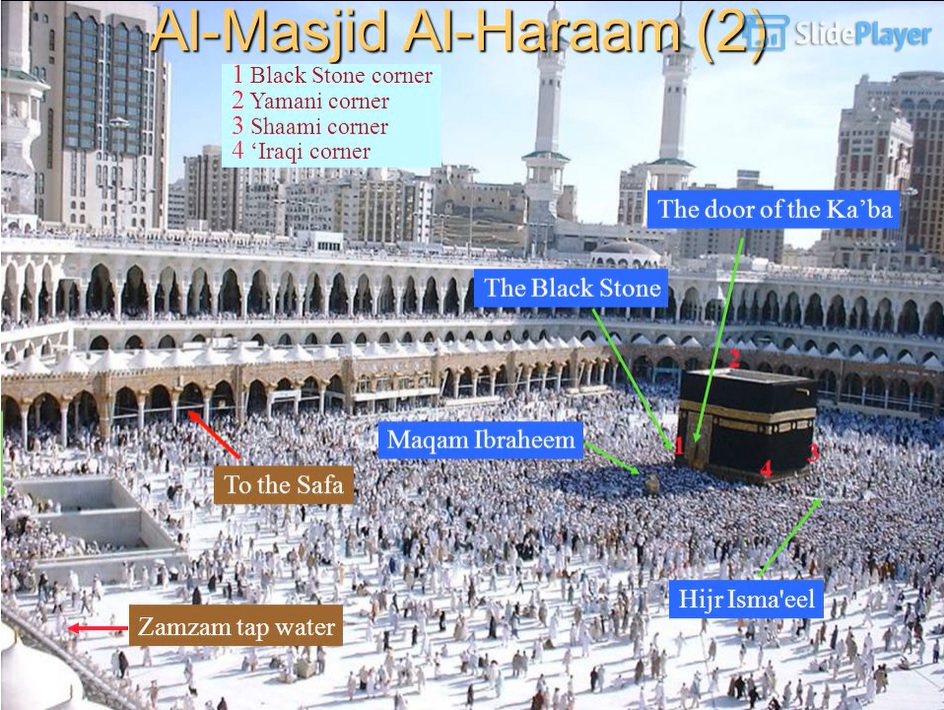
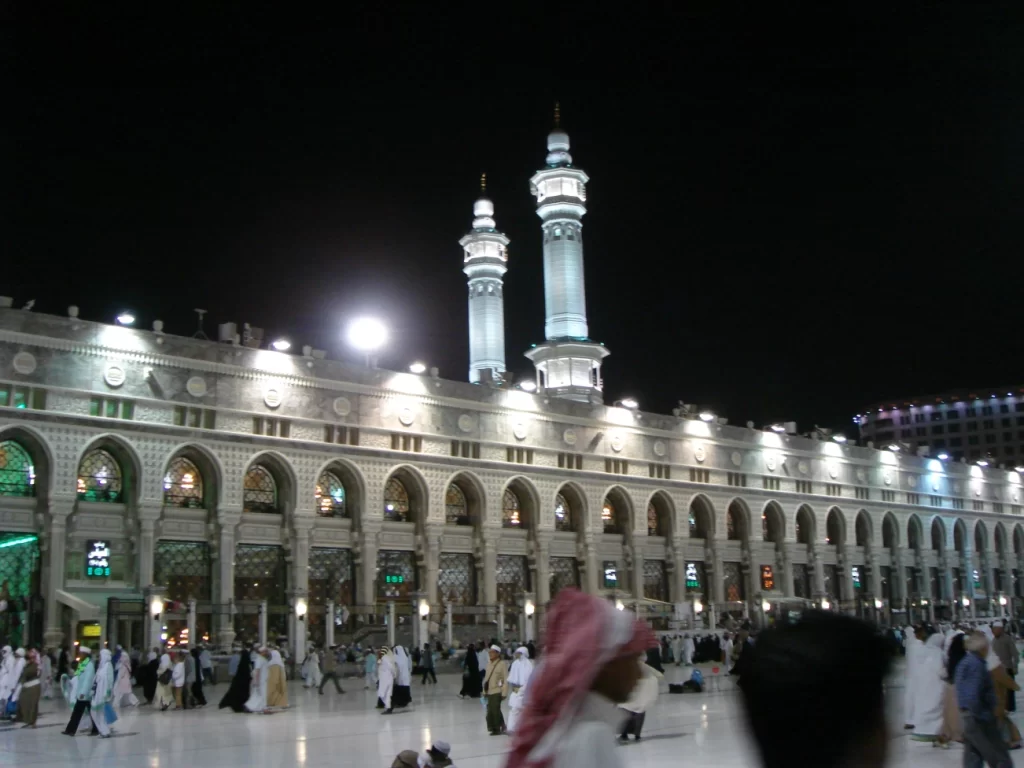
This is what it looks like from the top:

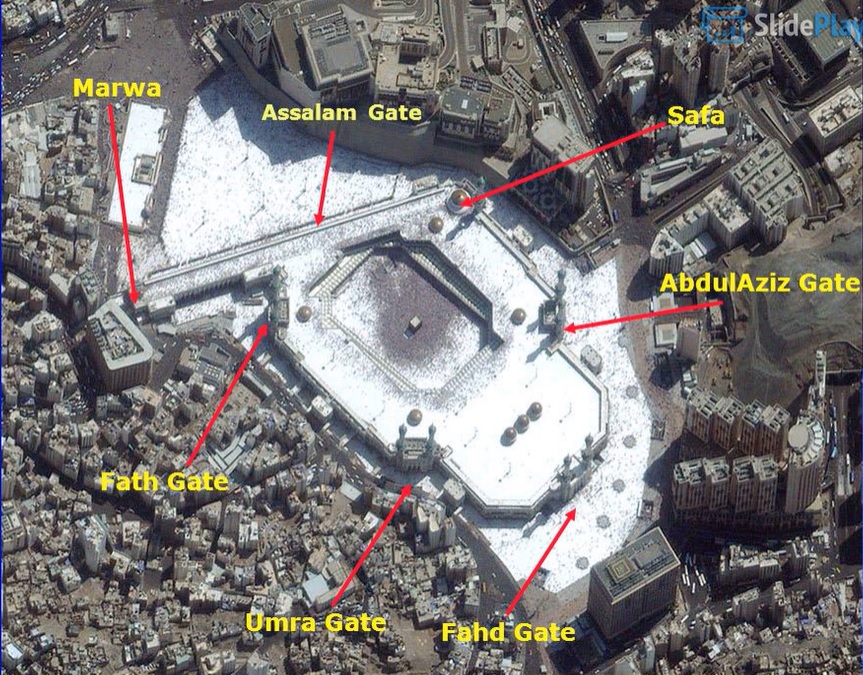
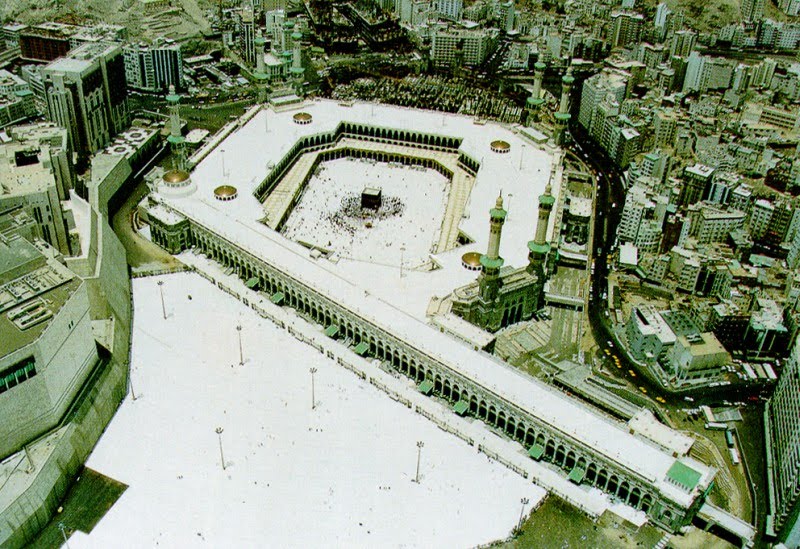
Here’s a diagram that clearly shows where the masaa is in relation to the Kabah:

TYPES OF SAEE
For a person performing only Umrah, they are required to do only one saee: the saee of Umrah. As for a person performing Hajj, the number of saees differs based on the type of Hajj one is performing.
As mentioned in Part 5, there are three types of Hajj: Tamattu, Qiran and Ifrad. This series focuses on Tamattu.
The one performing Tamattu does saee twice:
- The saee of Umrah (remember the Umrah is performed in the months of Hajj)
- The saee of Hajj which is done after the Tawaf Al-Ifaadhah (i.e. the tawaf of Hajj)
The one performing Qiran or Ifrad does only one saee. They can either perform saee after Tawaf Al-Qudoom (the tawaf they are required to do upon arrival) or else, delay it until after Tawaf Al-Ifaadhah.
Please note that unlike in Tawaf, there is no such thing as a nafl (supererogatory) saee.
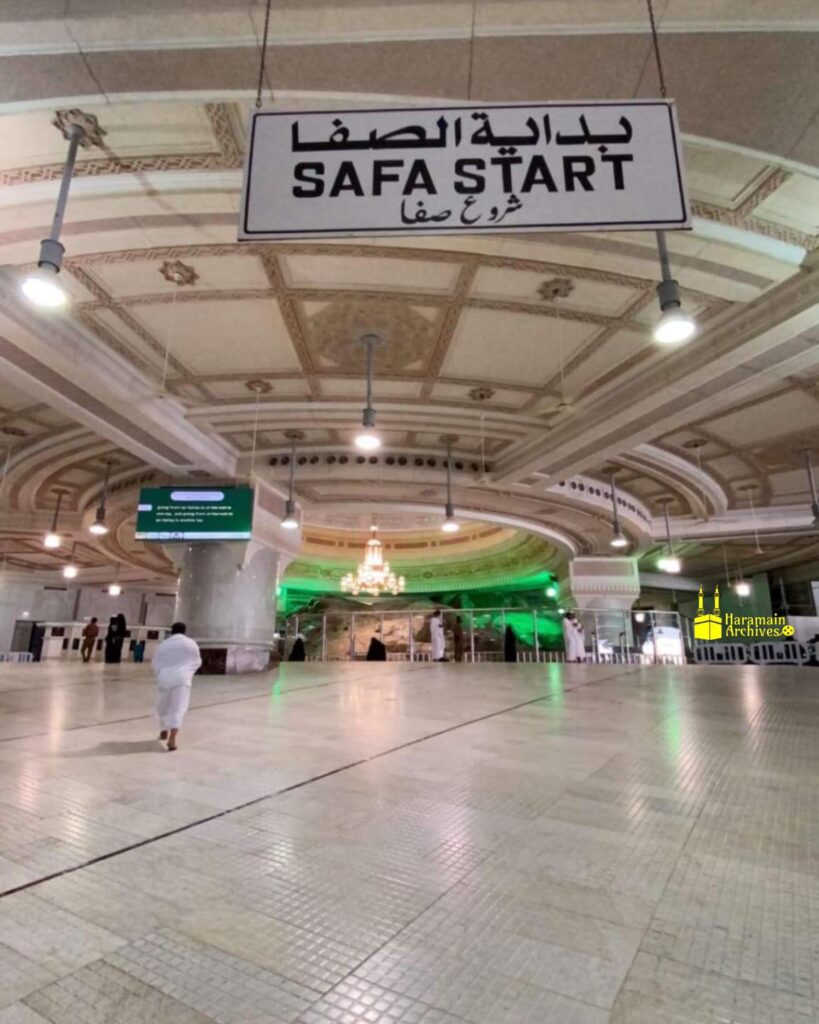
CONDITIONS OF SAEE
Shaikh Muhammad Ibn Abdul Wahhaab Al-Wassabi, in his book Manasik Al-Hajj wal-Umrah, lists 9 conditions for Saee. I’ve added the relevant proofs and changed the order in which he mentioned the conditions.
1.Islam
This is a condition for all acts of worship, not just saee.
وَمَن يَبْتَغِ غَيْرَ الْإِسْلَامِ دِينًا فَلَن يُقْبَلَ مِنْهُ وَهُوَ فِي الْآخِرَةِ مِنَ الْخَاسِرِينَ
And whoever seeks a religion other than Islam, it will never be accepted of him, and in the Hereafter he will be one of the losers. [Surah Aal-Imraan (3) : 85]
2. Sanity
An insane person is one of three types of people who are not responsible for their actions.
عَنْ عَائِشَةَ، أَنَّ رَسُولَ اللَّهِ ـ صلى الله عليه وسلم ـ قَالَ : رُفِعَ الْقَلَمُ عَنْ ثَلاَثَةٍ عَنِ النَّائِمِ حَتَّى يَسْتَيْقِظَ وَعَنِ الصَّغِيرِ حَتَّى يَكْبَرَ وَعَنِ الْمَجْنُونِ حَتَّى يَعْقِلَ أَوْ يُفِيقَ
It was narrated from Aishah (radiallahu anha) that the Messenger of Allah (sallallahu alaihi wasallam) said. “The Pen has been lifted from three: from the sleeping person until he awakens, from the minor until he grows up, and from the insane person until he comes to his senses.” [Sunan Ibn Majah, Hadeeth No. 2041. Graded “sahih” (authentic) by Al-Albani.]
3. Intention
The intention is in the heart. It is an innovation to say it out loud.
عن عُمَرَ بْنَ الْخَطَّابِ ـ رضى الله عنه قَالَ سَمِعْتُ رَسُولَ اللَّهِ صلى الله عليه وسلم يَقُولُ :إِنَّمَا الأَعْمَالُ بِالنِّيَّاتِ، وَإِنَّمَا لِكُلِّ امْرِئٍ مَا نَوَى، فَمَنْ كَانَتْ هِجْرَتُهُ إِلَى دُنْيَا يُصِيبُهَا أَوْ إِلَى امْرَأَةٍ يَنْكِحُهَا فَهِجْرَتُهُ إِلَى مَا هَاجَرَ إِلَيْهِ
Umar ibn Al-Khattab (radiallahu anhu) narrated: I heard Allah’s Messenger (sallallahu alaihi wasallam) saying, “The reward of deeds depends upon the intentions and every person will get the reward according to what he has intended. So whoever emigrated for worldly benefits or for a woman to marry, his emigration was for what he emigrated for.” [Sahih Al-Bukhari, Volume 1, Hadeeth No. 1]
Shaikh Saeed ibn Ali Al-Qahtani (author of ‘Hisn Al-Muslim) states in this book “Manasik Al-Hajj wal-Umrah” that one needs to intend that one is doing saee. If one does it without that, and is just walking between As-Safa and Al-Marwah to search for a child for instance, then this is not saee. He also pointed out that there were those from the people of knowledge who stated that one needs to intend which saee i.e. the one for Umrah or for Hajj.
4. That it be sincerely for the sake of Allah
Obviously, this is a condition for all acts of worship.
عَنْ عُمَرَ، أَنَّ رَسُولَ اللَّهِ صلى الله عليه وسلم قَالَ : الأَعْمَالُ بِالنِّيَّةِ، وَلِكُلِّ امْرِئٍ مَا نَوَى، فَمَنْ كَانَتْ هِجْرَتُهُ إِلَى اللَّهِ وَرَسُولِهِ، فَهِجْرَتُهُ إِلَى اللَّهِ وَرَسُولِهِ، وَمَنْ كَانَتْ هِجْرَتُهُ لِدُنْيَا يُصِيبُهَا، أَوِ امْرَأَةٍ يَتَزَوَّجُهَا، فَهِجْرَتُهُ إِلَى مَا هَاجَرَ إِلَيْهِ
Narrated Umar (radiallahu anhu): Allah’s Messenger (sallallahu alaihi wasallam) said, “The reward of deeds depends upon the intention and every person will get the reward according to what he has intended. So whoever emigrated for Allah and His Messenger, then his emigration was for Allah and His Messenger. And whoever emigrated for worldly benefits or for a woman to marry, his emigration was for what he emigrated for.” [Sahih Al-Bukhari, Volume 1, Hadeeth No. 51]
5. That it occurs after a correct Tawaf
A correct tawaf as in a valid one which fulfilled the requirements mentioned in the previous part.
This is except in the case of Tawaf Al-Ifaadhah (i.e. the Tawaf of Hajj), which can be preceded by Saee.
عَنْ أُسَامَةَ بْنِ شَرِيكٍ، قَالَ خَرَجْتُ مَعَ النَّبِيِّ صلى الله عليه وسلم حَاجًّا فَكَانَ النَّاسُ يَأْتُونَهُ فَمَنْ قَالَ يَا رَسُولَ اللَّهِ سَعَيْتُ قَبْلَ أَنْ أَطُوفَ أَوْ قَدَّمْتُ شَيْئًا أَوْ أَخَّرْتُ شَيْئًا . فَكَانَ يَقُولُ : لاَ حَرَجَ لاَ حَرَجَ إِلاَّ عَلَى رَجُلٍ اقْتَرَضَ عِرْضَ رَجُلٍ مُسْلِمٍ وَهُوَ ظَالِمٌ فَذَلِكَ الَّذِي حَرِجَ وَهَلَكَ
Usamah bin Sharik (radiallahu anhu) said “I went out with the Prophet (sallallahu alaihi wasallam) to perform Hajj, and the people were coming to him. One would say “Messenger of Allah (sallallahu alaihi wasallam) I did saee before I did tawaf” or “I did something before the its proper time” or “I did something after its proper time”. He would reply “No harm will come; no harm will come except to one who defames a Muslim acting wrongfully. That is the one who will be in trouble and will perish. [Sunan Abee Dawood, Hadeeth No. 2015. Graded “sahih” (authentic) by Al-Albani.]
Please note that there is a difference of opinion over this. Most scholars do not believe that saee can precede tawaf even during Hajj. Shaikh Saeed Al-Qahtani pointed out that Imam Ahmad thought this hadeeth referred to the case where a person forgot or was ignorant. Allah knows Best.
6. That it be 7 circuits
عَنْ عَمْرِو بْنِ دِينَارٍ، قَالَ سَأَلْنَا ابْنَ عُمَرَ ـ رضى الله عنه ـ عَنْ رَجُلٍ، طَافَ بِالْبَيْتِ فِي عُمْرَةٍ، وَلَمْ يَطُفْ بَيْنَ الصَّفَا وَالْمَرْوَةِ أَيَأْتِي امْرَأَتَهُ فَقَالَ قَدِمَ النَّبِيُّ صلى الله عليه وسلم فَطَافَ بِالْبَيْتِ سَبْعًا، وَصَلَّى خَلْفَ الْمَقَامِ رَكْعَتَيْنِ، فَطَافَ بَيْنَ الصَّفَا وَالْمَرْوَةِ سَبْعًا {لَقَدْ كَانَ لَكُمْ فِي رَسُولِ اللَّهِ أُسْوَةٌ حَسَنَةٌ}. وَسَأَلْنَا جَابِرَ بْنَ عَبْدِ اللَّهِ ـ رضى الله عنهما ـ فَقَالَ لاَ يَقْرَبَنَّهَا حَتَّى يَطُوفَ بَيْنَ الصَّفَا وَالْمَرْوَةِ.
Narrated Amr bin Dinar: We asked Ibn Umar (radiallahu anhuma) whether a man who, while performing Umrah, had performed Tawaf of the Kabah; and had not yet performed Tawaf between Safa and Marwah, could have sexual relation with his wife. So he (Ibn Umar) said “The Prophet (sallallahu alaihi wasallam) reached Makkah and performed the seven rounds (of Tawaf) of the Kabah and then offered a two rakah prayer behind Maqam Ibrahim and then performed the seven rounds (of Tawaf) between Safa and Marwah.” [He added]:
لَّقَدْ كَانَ لَكُمْ فِي رَسُولِ اللَّهِ أُسْوَةٌ حَسَنَةٌ
“Indeed in the Messenger of Allah (Muhammad) you have a good example.” [Surah Al-Ahzab (33) : 21]
We asked Jabir bin Abdullah (radiallahu anhuma) (the same question) and he said, “He (that man) should not come near (his wife) till he has completed Tawaf between Safa and Marwah*.” [Sahih Al-Bukhari, Volume 2, Hadeeth No. 708]
[*Tawaf between Al-Safa and Al-Marwah means saee.]
Please note that the first circuit starts at As-Safa and ends at Al-Marwah. The second circuit starts at Al-Marwah and ends at As-Safa and so on. Some people think that one circuit is going from As-Safa to Al-Marwah and then back to As-Safa. That’s not correct, subhan Allah!
Here’s a diagram which explains this well:

7. That it begins with As-Safa and ends with Al-Marwah
It states in the Hadeeth of Jaabir (radiallahu anhu):
ثُمَّ خَرَجَ مِنَ الْبَابِ إِلَى الصَّفَا. فَلَمَّا دَنَا مِنَ الصَّفَا قَرَأَ: {إِنَّ الصَّفَا وَالْمَرْوَةَ مِنْ شَعَائِرِ اللّهِ} (2البقرة الآية: 158) أَبْدَأُ بِمَا بَدَأَ اللّهُ بِهِ. فَبَدَأَ بِالصَّفَا. فَرَقِيَ عَلَيْهِ. حَتَّى رَأَى الْبَيْتَ فَاسْتَقْبَلَ الْقِبْلَةَ. فَوَحَّدَ اللّهَ، وَكَبَّرَهُ. وَقالَ: لاَ إِلهَ إِلاَّ اللّهُ وَحْدَهُ لاَ شَرِيكَ لَهُ. لَهُ الْمُلْكَ وَلَهُ الْحَمْدُ وَهُوَ عَلَى كُلِّ شَيْءٍ قَدِيرٌ. لاَ إِلهَ إِلاَّ اللّهُ وَحْدَهُ. أَنْجَزَ وَعْدَهُ. وَنَصَرَ عَبْدَهُ. وَهَزَمَ الأَحْزَابَ وَحْدَهُ. ثُمَّ دَعَا بَيْنَ ذَلِكَ. قَالَ مِثْلَ هَـذَا ثَلاَثَ مَرَّاتٍ. ثُمَّ نَزَلَ إِلَى الْمَرْوَةِ. حَتَّى إِذَا انْصَبَّتْ قَدَمَاهُ فِي بَطْنِ الْوَادِي سَعَى. حَتَّى إِذَا صَعِيدَنَا مَشَى. حَتَّى أَتَى الْمَرْوَةَ. فَفَعَلَ عَلَى الْمَرْوَةِ كَمَا فَعَلَ عَلَى الصَّفَا. حَتَّى إِذَا كَانَ آخِرُ طَوَافِهِ عَلَى الْمَرْوَةِ فَقَالَ: لَوْ أَنِّي اسْتَقْبَلْتُ مِنْ أَمْرِي مَا اسْتَدْبَرْتُ لَمْ أَسُقِ الْهَدْيَ. وَجَعَلْتُهَا عُمْرَةً. فَمَنْ كَانَ مِنْكُمْ لَيْسَ مَعَهُ هَدْيٌ فَلْيَحِلَّ. وَلْيَجْعَلْهَا عُمْرَةً
He then went out of the gate to Safa and as he reached near it he recited:
إِنَّ الصَّفَا وَالْمَرْوَةَ مِن شَعَائِرِ اللَّـهِ
Verily, Al-Safa and al-Marwa are among the signs appointed by Allah. [Surah Al-Baqarah (2) : 158]
(adding:) I begin with what Allah began with. He first mounted Safa until he saw the House, and facing Qibla he declared the Oneness of Allah and glorified Him, and said: ”There is none worthy of worship except Allah alone, there is no partner with Him. His is the Sovereignty, to Him praise is due, and He is Powerful over everything. There is none worthy of worship except Allah alone, Who fulfilled His promise, helped His servant and defeated the confederates alone.” He then made supplication in the course of that saying such words three times. He then descended and walked towards Marwah, and when his feet came down in the bottom of the valley, he ran, and when he began to ascend he walked till he reached Marwah. There he did as he had done at Safa. And when it was his last running at Marwah he said: If I had known beforehand what I have come to know afterwards, I would not have brought sacrificial animals and would have performed an Umrah. So, he who among you has not the sacrificial animals with him should put off ihram and treat it as an Umrah. [Sahih Muslim, Hadeeth No. 2803]
Allah mentioned As-Safa before Al-Marwah which is why the Prophet (sallallahu alaihi wasallam) started with As-Safa. We should do the same as we are obliged to obey Allah and His Messenger (sallallahu alaihi wasallam).
If someone accidentally starts at Al-Marwah, then they need to add another lap to their seven laps as their first lap would be invalid.
8. Performing the saee along the specified path between As-Safa and Al-Marwah
Shaikh Saeed Al-Qahtani points out that this path was known from the time of Ibrahim (alaihissalaam) and Haajar (radiallahu anha) and this information was preserved from generation to generation until the Prophet’s (sallallahu alaihi wasallam) time.
He also pointed out that there were 100,000 Companions (radiallahu anhum) doing Hajj with the Prophet (sallallahu alaihi wasallam) and they all did saee on this path and not on other than it.
In recent times, the masaa (the area where saee is performed) was expanded, leading to a difference of opinion over whether one is allowed to do saee along the extended path.
This is what the extension looks like:
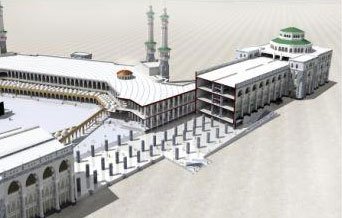
The blue highlighted area is the extension.
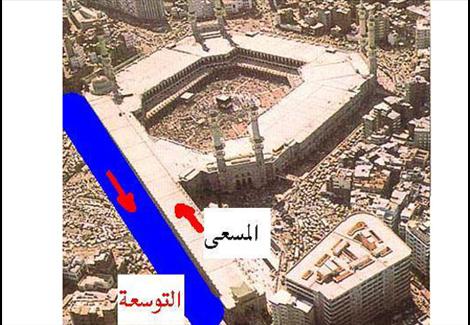
The yellow highlighted area is the extension whilst the green highlighted area is the original path.

The area on the left is the original path whilst the area on the right is the extended path.

My advice would be to stick to the original path and not do the saee on the new extension so as to be on the safe side.
Please note that there are multiple floors in which you can do saee. If you are doing it in the upper floors, then please read this.
9. To traverse the full distance between As-Safa and Al-Marwah
Shaikh Saeed Al-Qahtani quotes Imam Ash-Shinqeeti who pointed out that the majority of scholars state that the whole distance between As-Safa and Al-Marwah must be covered in each circuit or lap. This is because the distance was defined by the Lawgiver (meaning Allah).
The total distance seems to be as follows:
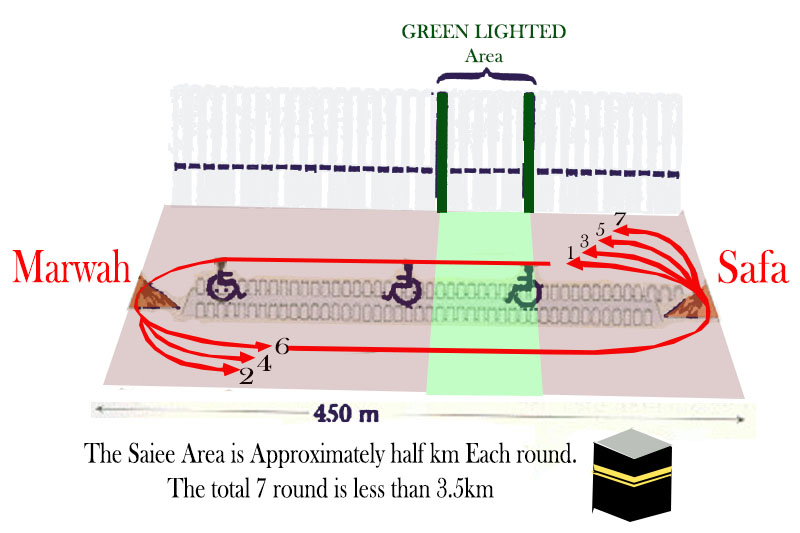
Please note that taharah (purity) is not a condition of saee. However, it is obviously better to do it in a state of taharah (purity). So if one had broken their wudhu (ablution) after tawaf, they should do renew their wudhu before saee as it is better to do so, even though it is not a condition.
Also, menstruating women and those in post natal bleeding are allowed to do saee (assuming they managed to finish tawaf before they started to menstruate as saee needs to be preceded by tawaf).
عَنِ ابْنِ عَبَّاسٍ، رَفَعَ الْحَدِيثَ إِلَى رَسُولِ اللَّهِ صلى الله عليه وسلم : أَنَّ النُّفَسَاءَ وَالْحَائِضَ تَغْتَسِلُ وَتُحْرِمُ وَتَقْضِي الْمَنَاسِكَ كُلَّهَا غَيْرَ أَنْ لاَ تَطُوفَ بِالْبَيْتِ حَتَّى تَطْهُرَ
Ibn Abbas (radiallahu anhuma) narrated (that the Prophet (sallallahu alaihi wasallam said): “The women in post-natal bleeding and menses were to perform Ghusl (bath), enter Ihram and carry out all of the rites except for Tawaf around the House, until they become clean.” [Jaami At-Tirmidhi, Hadeeth No. 945. For some reason, there are two ahadeeth numbered 945. This is the second one. Graded “sahih” (authentic) by Al-Albani.]
As for continuity in saee, there is a difference of opinion over this. It is better not to take any unnecessary breaks. Please note though that one SHOULD stop for the obligatory prayers when the congregational prayer is taking place. They should then resume their saee from where they stopped.
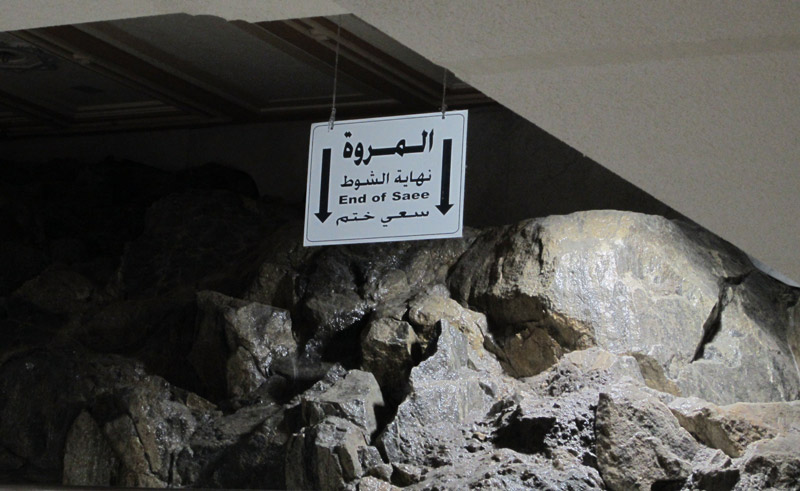
HOW TO DO SAEE
Imam Ibn Kathir had some important words of advice for the one doing saee in his tafsir of the following ayah (verse):
إِنَّ الصَّفَا وَالْمَرْوَةَ مِن شَعَائِرِ اللَّهِ ۖ فَمَنْ حَجَّ الْبَيْتَ أَوِ اعْتَمَرَ فَلَا جُنَاحَ عَلَيْهِ أَن يَطَّوَّفَ بِهِمَا ۚ وَمَن تَطَوَّعَ خَيْرًا فَإِنَّ اللَّهَ شَاكِرٌ عَلِيمٌ
Verily! As-Safa and Al-Marwah (two mountains in Makkah) are of the Symbols of Allah. So it is not a sin on him who perform Hajj or Umrah (pilgrimage) of the House (the Kabah at Makkah) to perform the going (Tawaf) between them (As-Safa and Al-Marwah). And whoever does good voluntarily, then verily, Allah is All-Recogniser, All-Knower. [Surah Al-Baqarah (2) : 158]
“Earlier we mentioned the Hadith by Ibn Abbas that the origin of Tawaf comes from the Tawaf of Hajar (Prophet Ibrahim’s wife), between As-Safa and Al-Marwah seeking water for her son (Ismail) Ibrahim had left them in Makkah, where there was no habitation for her. When Hajar feared that her son would die, she stood up and begged Allah for His help and kept going back and forth in that blessed area between As-Safa and Al-Marwah. She was humble, fearful, frightened and meek before Allah. Allah answered her prayers, relieved her of her loneliness, ended her dilemma and made the well of Zamzam bring forth its water for her, which is:
« طَعَامُ طُعْمٍ، وَشِفَاءُ سُقْم »
(A tasty (or nutritional) food and a remedy for the illness.)
Therefore, whoever performs Sai between As-Safa and Al-Marwah should remember his meekness, humbleness and need for Allah to guide his heart, lead his affairs to success and forgive his sins. He should also want Allah to eliminate his shortcomings and errors and to guide him to the straight path. He should ask Allah to keep him firm on this path until he meets death, and to change his situation from that of sin and errors to that of perfection and being forgiven, — the same providence which was provided to Hajar.”
The following are the steps that one should follow whilst doing saee:
1.Try to enter the masaa (the saee area) through As-Safa gate if possible
It states in the Hadeeth of Jaabir (radiallahu anhu):
ثُمَّ خَرَجَ مِنَ الْبَابِ إِلَى الصَّفَا
The gate being referred to above is As-Safa gate. Today, it is one of the main gates that lead into Masjid Al-Haram. Here’s a list of all the gates of the Haram.
Here’s a video of some Hajj pilgrims entering through one of the gates of the Haram.
Scene as the Hujjaj enter through the gates of Masjid Al Haram towards the Ka’bah #Hajj pic.twitter.com/45sNbN04io
— (@HaramainInfo) July 29, 2020
This what the As-Safa gate looked like some time in the past:
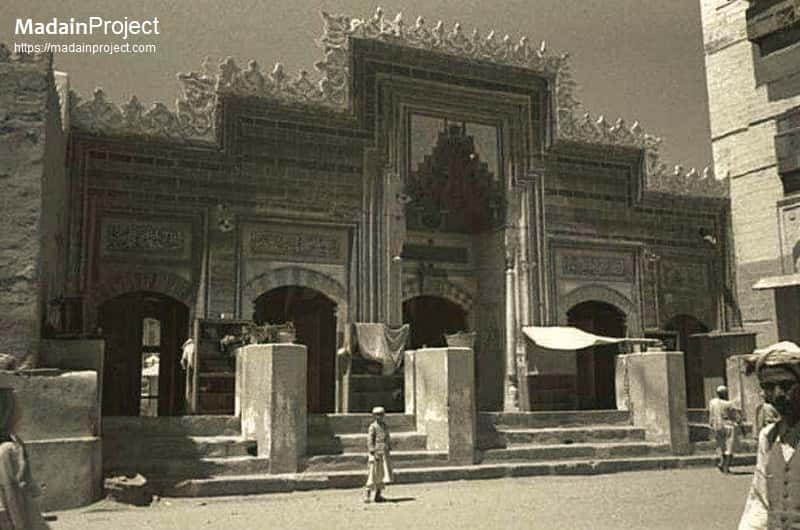
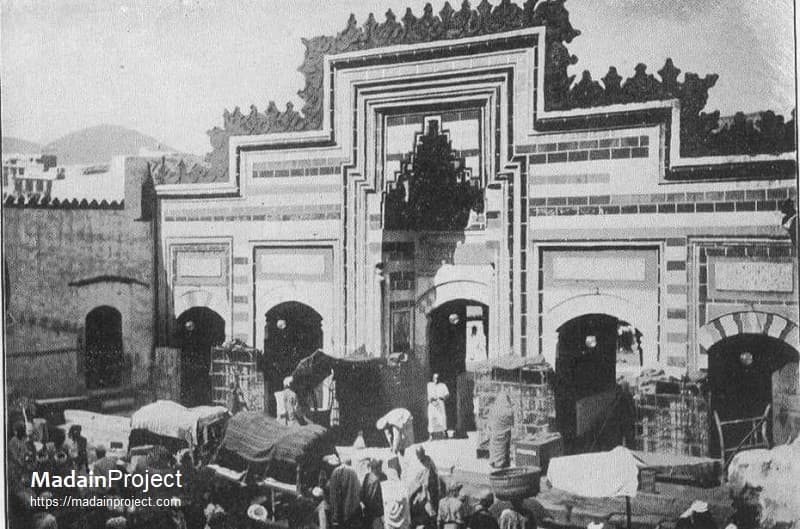
Here’s what it looks like in today’s time:
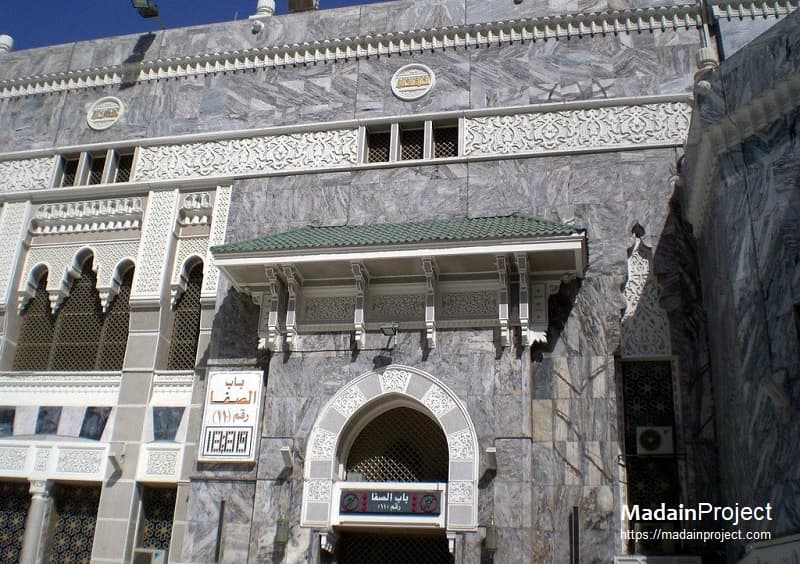
Here are two videos that show people entering the gate, the first from afar and the second from close by.
2. Approach As-Safa and recite what is required
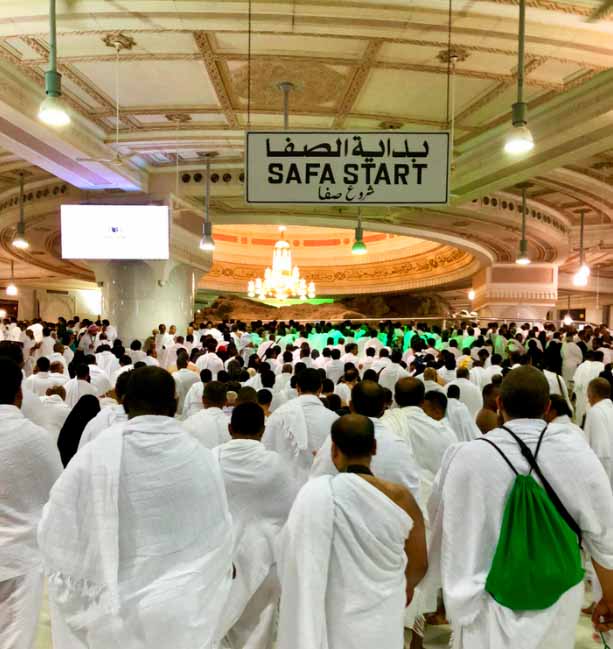
It states in the Hadeeth of Jaabir (radiallahu anhu):
ثُمَّ خَرَجَ مِنَ الْبَابِ إِلَى الصَّفَا. فَلَمَّا دَنَا مِنَ الصَّفَا قَرَأَ: {إِنَّ الصَّفَا وَالْمَرْوَةَ مِنْ شَعَائِرِ اللّهِ} (2البقرة الآية: 158) أَبْدَأُ بِمَا بَدَأَ اللّهُ بِهِ. فَبَدَأَ بِالصَّفَا
He then went out of the gate to Safa and as he reached near it he recited:
إِنَّ الصَّفَا وَالْمَرْوَةَ مِن شَعَائِرِ اللَّـهِ
Verily, Al-Safa and al-Marwa are among the signs appointed by Allah. [Surah Al-Baqarah (2) : 158]
(adding:)
أَبْدَأُ بِمَا بَدَأَ اللّهُ بِهِ
Abda’u bimā bada’allāhu bih.
“I begin with what Allah began with.”
So he started with Safa, climbing up until he could see the House. [Sahih Muslim, Hadeeth No. 2803]
You can also say “We begin” instead of “I begin”. In another narration, it states:
ثُمَّ رَجَعَ إِلَى الْبَيْتِ فَاسْتَلَمَ الرُّكْنَ ثُمَّ خَرَجَ مِنَ الْبَابِ إِلَى الصَّفَا حَتَّى إِذَا دَنَا مِنَ الصَّفَا قَرَأَ : {إِنَّ الصَّفَا وَالْمَرْوَةَ مِنْ شَعَائِرِ اللَّهِ ) . نَبْدَأُ بِمَا بَدَأَ اللَّهُ بِهِ . فَبَدَأَ بِالصَّفَا .
“Then he went back to the House and touched the Corner, then he went out through the gate to Safa. When he drew near to Safa he recited:
إِنَّ الصَّفَا وَالْمَرْوَةَ مِن شَعَائِرِ اللَّـهِ
Verily, As-Safa and al-Marwah are among the signs appointed by Allah. [Surah Al-Baqarah (2) : 158]
(and said:)
نَبْدَأُ بِمَا بَدَأَ اللَّهُ بِهِ
Nabda’u bimā bada’allāhu bih.
“We begin with what Allah began with”.
So he started with Safa. [Sunan Ibn Majah, Hadeeth No. 3074. Graded “sahih” (authentic) by Al-Albani. This is part of the narration. You can read the whole hadeeth here.]
There is a narration which says “Abdau” (Begin) as a command (as opposed to “I begin” or “We begin”) but Shaikh Al-Albani stated in his book, Hajj of the Prophet (sallallahu alaihi wasallam) that this narration was shaadh (odd). Therefore, one should avoid using “Abdau” in this supplication.
So, one should recite what the Prophet (sallallahu alaihi wasallam) recited and say what he said when approaching As-Safa.
Please note that the above is only meant to be recited when approaching As-Safa for the first lap. It is not meant to be repeated when approaching As-Safa in the ensuing laps nor should it be said when approaching Al-Marwah.
3. Mount As-Safa, face the Qiblah, recite what is required and supplicate
It states in the Hadeeth of Jaabir (radiallahu anhu):
فَبَدَأَ بِالصَّفَا. فَرَقِيَ عَلَيْهِ. حَتَّى رَأَى الْبَيْتَ فَاسْتَقْبَلَ الْقِبْلَةَ. فَوَحَّدَ اللّهَ، وَكَبَّرَهُ. وَقالَ: لاَ إِلهَ إِلاَّ اللّهُ وَحْدَهُ لاَ شَرِيكَ لَهُ. لَهُ الْمُلْكَ وَلَهُ الْحَمْدُ وَهُوَ عَلَى كُلِّ شَيْءٍ قَدِيرٌ. لاَ إِلهَ إِلاَّ اللّهُ وَحْدَهُ. أَنْجَزَ وَعْدَهُ. وَنَصَرَ عَبْدَهُ. وَهَزَمَ الأَحْزَابَ وَحْدَهُ. ثُمَّ دَعَا بَيْنَ ذَلِكَ. قَالَ مِثْلَ هَـذَا ثَلاَثَ مَرَّاتٍ
He first mounted Safa until he saw the House, and facing Qiblah he declared the Oneness of Allah and magnified Him (by saying: “Allahu Akbar”), and said:
لاَ إِلهَ إِلاَّ اللّهُ وَحْدَهُ لاَ شَرِيكَ لَهُ. لَهُ الْمُلْكَ وَلَهُ الْحَمْدُ وَهُوَ عَلَى كُلِّ شَيْءٍ قَدِيرٌ. لاَ إِلهَ إِلاَّ اللّهُ وَحْدَهُ. أَنْجَزَ وَعْدَهُ. وَنَصَرَ عَبْدَهُ. وَهَزَمَ الأَحْزَابَ وَحْدَهُ
“Lā ilāha ‘illallāh waḥdahu lā sharīka lah, Lahu ‘l-mulku wa lahu ‘l-ḥamd wa Huwa `alā kulli shay’in Qadīr, lā ‘ilāha illallāhu waḥdahu, anjaza wa`dahu, wa naṣara `abdahu, wa hazama ‘l ‘aḥzāba waḥdah. (There is none worthy of worship except Allah alone, there is no partner with Him. His is the Sovereignty, to Him praise is due, and He is Powerful over everything. There is none worthy of worship except Allah alone, Who fulfilled His promise, helped His servant and defeated the confederates alone.)” He then made supplication in the course of that saying such words three times. [Sahih Muslim, Hadeeth No. 2803]
Many Hajj and Umrah books use the wording mentioned above. However, there is a longer version mentioned in the following hadeeth:
فَبَدَأَ بِالصَّفَا . فَرَقِيَ عَلَيْهِ حَتَّى رَأَى الْبَيْتَ فَكَبَّرَ اللَّهَ وَهَلَّلَهُ وَحَمِدَهُ وَقَالَ : لاَ إِلَهَ إِلاَّ اللَّهُ وَحْدَهُ لاَ شَرِيكَ لَهُ لَهُ الْمُلْكُ وَلَهُ الْحَمْدُ يُحْيِي وَيُمِيتُ وَهُوَ عَلَى كُلِّ شَىْءٍ قَدِيرٌ لاَ إِلَهَ إِلاَّ اللَّهُ وَحْدَهُ لاَ شَرِيكَ لَهُ أَنْجَزَ وَعْدَهُ وَنَصَرَ عَبْدَهُ وَهَزَمَ الأَحْزَابَ وَحْدَهُ . ثُمَّ دَعَا بَيْنَ ذَلِكَ وَقَالَ مِثْلَ هَذَا ثَلاَثَ مَرَّاتٍ
So he started with Safa and climbed it until he could see the House, then proclaimed the greatness of Allah (by saying: “Allahu Akbar”) and said Tahlil (by saying “Laa ilaaha illallah”) and praised Him (by saying “Alhamdulillah”), and he said:
لاَ إِلَهَ إِلاَّ اللَّهُ وَحْدَهُ لاَ شَرِيكَ لَهُ لَهُ الْمُلْكُ وَلَهُ الْحَمْدُ يُحْيِي وَيُمِيتُ وَهُوَ عَلَى كُلِّ شَىْءٍ قَدِيرٌ لاَ إِلَهَ إِلاَّ اللَّهُ وَحْدَهُ لاَ شَرِيكَ لَهُ أَنْجَزَ وَعْدَهُ وَنَصَرَ عَبْدَهُ وَهَزَمَ الأَحْزَابَ وَحْدَهُ
“Laa ilaaha illallahu wahdahu laa sharika lahu, lahul-mulku, wa lahul-hamdu, yuhyi wa yumit wa huwa ‘ala kulli shai’in Qadir. Laa ilaaha illallah wahdahu, Laa sharika lahu anjaza wa’dahu, wa nasara ‘abdahu, wa hazamal-Ahzaba wahdahu (None has the right to be worshiped but Allah alone, with no partner or associate; His is the dominion, all praise is due to Him, He gives life and causes death and He is able to do all things. None has the right to be worshiped but Allah alone; He has no partner or associate, He fulfilled His promise, granted victory to His slave, and defeated the Confederates alone).”
And he said that three times, supplicating in between. [Sunan Ibn Majah, Hadeeth No. 3074. Graded “sahih” (authentic) by Al-Albani. This is part of the narration. You can read the whole hadeeth here. ]
In yet another narration, it states that he did takbeer (saying “Allahu Akbar”) three times:
عَنْ جَابِرٍ، أَنَّ رَسُولَ اللَّهِ صلى الله عليه وسلم كَانَ إِذَا وَقَفَ عَلَى الصَّفَا يُكَبِّرُ ثَلاَثًا وَيَقُولُ : لاَ إِلَهَ إِلاَّ اللَّهُ وَحْدَهُ لاَ شَرِيكَ لَهُ لَهُ الْمُلْكُ وَلَهُ الْحَمْدُ وَهُوَ عَلَى كُلِّ شَىْءٍ قَدِيرٌ . يَصْنَعُ ذَلِكَ ثَلاَثَ مَرَّاتٍ وَيَدْعُو وَيَصْنَعُ عَلَى الْمَرْوَةِ مِثْلَ ذَلِكَ
عَنْ جَابِرِ بْنِ عَبْدِ اللَّهِ، أَتَى رَسُولُ اللَّهِ صلى الله عليه وسلم الْمَرْوَةَ فَصَعِدَ فِيهَا ثُمَّ بَدَا لَهُ الْبَيْتُ فَقَالَ: لاَ إِلَهَ إِلاَّ اللَّهُ وَحْدَهُ لاَ شَرِيكَ لَهُ لَهُ الْمُلْكُ وَلَهُ الْحَمْدُ وَهُوَ عَلَى كُلِّ شَىْءٍ قَدِيرٌ . قَالَ ذَلِكَ ثَلاَثَ مَرَّاتٍ ثُمَّ ذَكَرَ اللَّهَ وَسَبَّحَهُ وَحَمِدَهُ ثُمَّ دَعَا بِمَا شَاءَ اللَّهُ فَعَلَ هَذَا حَتَّى فَرَغَ مِنَ الطَّوَافِ
لاَ إِلَهَ إِلاَّ اللَّهُ وَحْدَهُ لاَ شَرِيكَ لَهُ لَهُ الْمُلْكُ وَلَهُ الْحَمْدُ وَهُوَ عَلَى كُلِّ شَىْءٍ قَدِيرٌ
عَنْ أَبِي هُرَيْرَةَ، قَالَ أَقْبَلَ رَسُولُ اللَّهِ صلى الله عليه وسلم فَدَخَلَ مَكَّةَ فَأَقْبَلَ رَسُولُ اللَّهِ صلى الله عليه وسلم إِلَى الْحَجَرِ فَاسْتَلَمَهُ ثُمَّ طَافَ بِالْبَيْتِ ثُمَّ أَتَى الصَّفَا فَعَلاَهُ حَيْثُ يَنْظُرُ إِلَى الْبَيْتِ فَرَفَعَ يَدَيْهِ فَجَعَلَ يَذْكُرُ اللَّهَ مَا شَاءَ أَنْ يَذْكُرَهُ وَيَدْعُوهُ قَالَ وَالأَنْصَارُ تَحْتَهُ قَالَ هَاشِمٌ فَدَعَا وَحَمِدَ اللَّهَ وَدَعَا بِمَا شَاءَ أَنْ يَدْعُوَ
Narrated Abu Hurairah (radiallahu anhu): The Messenger of Allah (sallallahu alaihi wasallam) came and entered Makkah, and after the Messenger of Allah sallallahu alaihi wasallam) had gone forward to the Stone, and touched it, he went round the House (the Kabah). He then went to as-Safa and mounted it so that he could look at the House. Then he raised his hands began to make mention of Allah as much as he wished and make supplication. The narrator said: The Ansar were beneath him. The narrator Hashim said: He prayed and praised Allah and asked Him for what he wished to ask. [Sunan Abee Dawood, Hadeeth No. 1872. Shaikh Al-Albani said that the hadeeth was “sahih” (authentic) apart from his saying “The Ansar were beneath him.”]
So one needs to climb As-Safa until one can see the Kabah. I should point out that in today’s time that might not be possible so one should just face the Qiblah after climbing As-Safa.
If one cannot climb As-Safa now, one should try to go as close to it as possible and then turn in the direction of the Qiblah. Shaikh Ibn Uthaimeen (rahimahullah) in his book, “Sharh Hadeeth Jaabir” pointed out that climbing As-Safa is not obligatory, rather it is recommended. Rather, a person is obliged to get as close to As-Safa as possible.
After one has mounted As-Safa (or has gotten close to it), one needs to raise their hands (whilst facing the Qiblah) and recite the following (whilst their hands are still raised):
- Takbir i.e اللهُ أَكْـبَر (Allahu akbar) which means Allah is the Most Great, three times.
- The following dua (supplication):
لاَ إِلَهَ إِلاَّ اللَّهُ وَحْدَهُ لاَ شَرِيكَ لَهُ لَهُ الْمُلْكُ وَلَهُ الْحَمْدُ يُحْيِي وَيُمِيتُ وَهُوَ عَلَى كُلِّ شَىْءٍ قَدِيرٌ لاَ إِلَهَ إِلاَّ اللَّهُ وَحْدَهُ لاَ شَرِيكَ لَهُ أَنْجَزَ وَعْدَهُ وَنَصَرَ عَبْدَهُ وَهَزَمَ الأَحْزَابَ وَحْدَهُ
La ilaha illallah wahdahu la sharika lahu, lahul-mulku, wa lahul-hamdu, yuhyi wa yumit wa huwa ‘ala kulli shai’in Qadir. La ilaha illallah wahdahu, La sharika lahu anjaza wa’dahu, wa nasara ‘abduhu, wa hazamal-Ahzaba wahdah
(None has the right to be worshipped but Allah alone, with no partner or associate; His is the dominion, all praise is due to Him, He gives life and causes death and He is able to do all things. None has the right to be worshiped but Allah alone; He has no partner or associate, He fulfilled His promise, granted victory to His slave, and defeated the Confederates alone).
After this, one supplicates for what one wants. Then one again recites the long supplication mentioned above. After this, one again supplicates for what they want. Then one recites the long supplication (for the third time). After this, one descends and heads towards Al-Marwah.
[Note: Some books do mention that one does dua after saying the long supplication for the third time. However, the wording in the ahadeeth seems to imply that he did dua between the long supplications i.e. only twice]
According to Shaikh Ibn Uthaimeen, in his book “Sharh Al-Mumti”, one is supposed to raise one’s hands for the takbir and the words to be recited.
Here’s a video of what to say. Please note that it uses the shorter version of the above mentioned dua.
Many years ago, I recall one of my teachers Ustadh Khalid Ismail pointing out that the reason the Prophet (sallallahu alaihi wasallam) said this dua on As-Safa was because he had started his dawah (invitation) to his people from As-Safa. So this was linked to that (the dua mentions defeating the Confederates). Allah knows Better.
عَنِ ابْنِ عَبَّاسٍ ـ رضى الله عنهما ـ قَالَ لَمَّا نَزَلَتْ {وَأَنْذِرْ عَشِيرَتَكَ الأَقْرَبِينَ} وَرَهْطَكَ مِنْهُمُ الْمُخْلَصِينَ، خَرَجَ رَسُولُ اللَّهِ صلى الله عليه وسلم حَتَّى صَعِدَ الصَّفَا فَهَتَفَ : يَا صَبَاحَاهْ . فَقَالُوا مَنْ هَذَا، فَاجْتَمَعُوا إِلَيْهِ. فَقَالَ : أَرَأَيْتُمْ إِنْ أَخْبَرْتُكُمْ أَنَّ خَيْلاً تَخْرُجُ مِنْ سَفْحِ هَذَا الْجَبَلِ أَكُنْتُمْ مُصَدِّقِيَّ . قَالُوا مَا جَرَّبْنَا عَلَيْكَ كَذِبًا. قَالَ : فَإِنِّي نَذِيرٌ لَكُمْ بَيْنَ يَدَىْ عَذَابٍ شَدِيدٍ . قَالَ أَبُو لَهَبٍ تَبًّا لَكَ مَا جَمَعْتَنَا إِلاَّ لِهَذَا ثُمَّ قَامَ فَنَزَلَتْ {تَبَّتْ يَدَا أَبِي لَهَبٍ وَتَبَّ} وَقَدْ تَبَّ
Narrated Ibn Abbas (radiallahu anhuma): When the Verse:
وَأَنذِرْ عَشِيرَتَكَ الْأَقْرَبِينَ
And warn your tribe (O Muhammad) of near kindred. [Surah Ash-Shuara (26): 214]
was revealed. Allah’s Messenger (sallallahu alaihi wasallam) went out, and when he had ascended As-Safa mountain, he shouted, “O Sabahah!” The people said, “Who is that?” “Then they gathered around him, whereupon he said, “Do you see? If I inform you that cavalrymen are proceeding up the side of this mountain, will you believe me?” They said, “We have never heard you telling a lie.” Then he said, “I am a plain warner to you of a coming severe punishment.” Abu Lahab said, “May you perish! You gathered us only for this reason? “ Then Abu Lahab went away. So
تَبَّتْ يَدَا أَبِي لَهَبٍ وَتَبَّ
Perish the two hands of Abu Lahab (an uncle of the Prophet), and perish he!
(i.e. the whole surah of Surah Lahab (No. 111) was revealed. [Sahih Al-Bukhari, Volume 6, Hadeeth No. 495]
4. Climb down and go towards Al-Marwah
After reciting all the duas, descend As-Safa and head towards Al-Marwah. Please try to stay in the old masaa and avoid the new extension, due to the difference of opinion.
One walks until one reaches the green lights. After this, the men are supposed to jog until they reach the end of the green lights. Women are supposed to walk the whole way and should not jog.
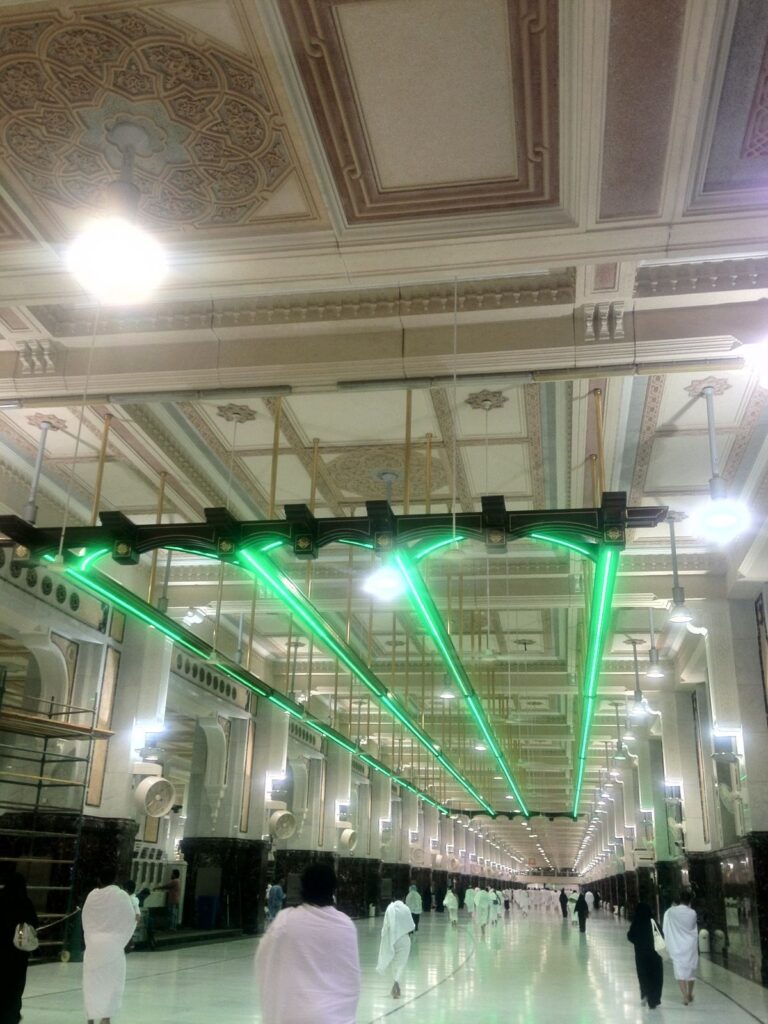
The following map shows the location of the green markers area from an aerial perspective.
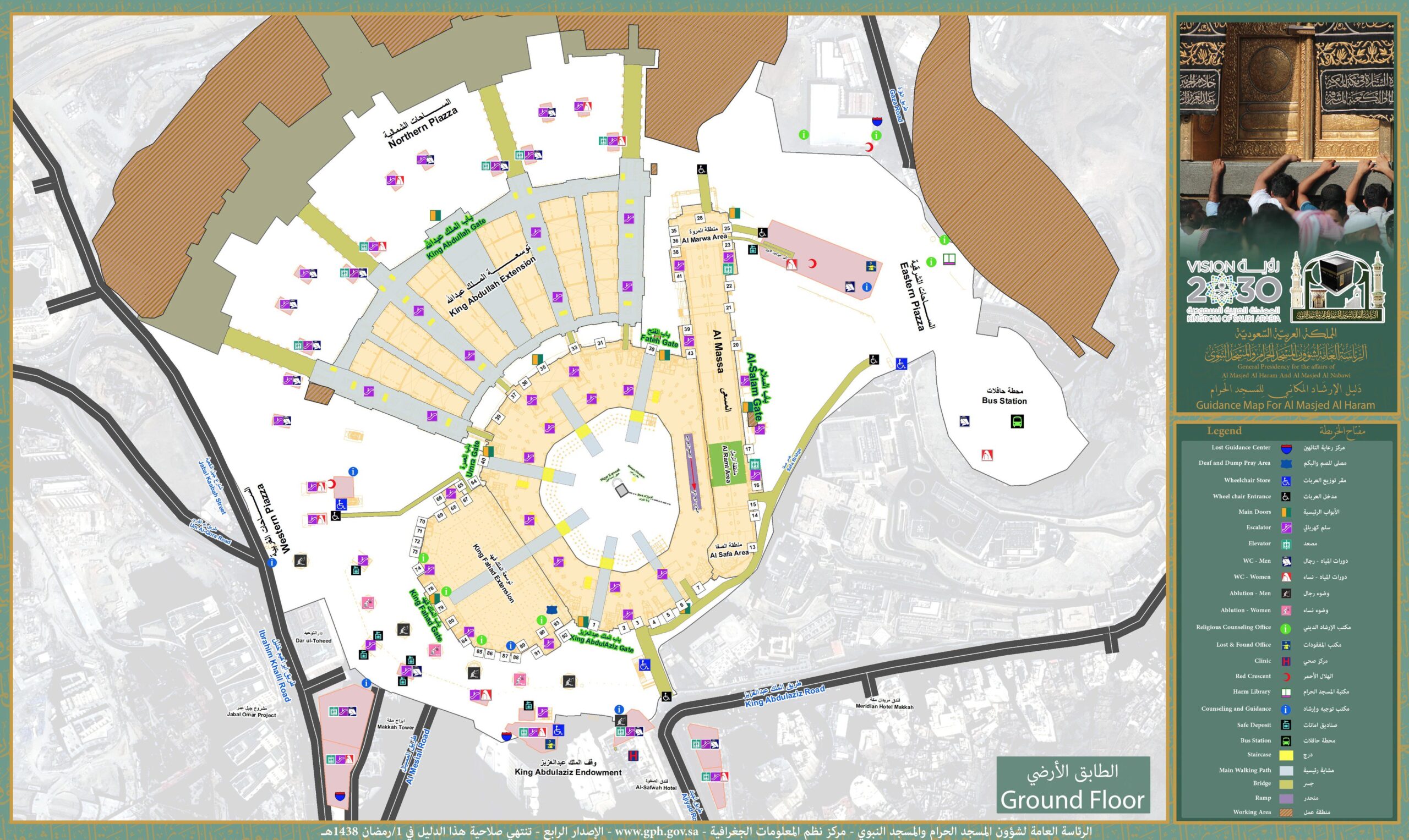
The men jog because the Prophet (sallallahu alaihi wasallam) did so. But why did he do so? The reason was mentioned in the discussion on tawaf in the previous part but I will repeat it here.
عَنِ ابْنِ عَبَّاسٍ ـ رضى الله عنهما ـ قَالَ إِنَّمَا سَعَى النَّبِيُّ صلى الله عليه وسلم بِالْبَيْتِ وَبَيْنَ الصَّفَا وَالْمَرْوَةِ لِيُرِيَ الْمُشْرِكِينَ قُوَّتَهُ
Narrated Ibn Abbas (radiallahu anhuma): The Prophet (sallallahu alaihi wasallam) hastened in going around the Kabah and between Safa and Marwah in order to show the pagans his strength. Ibn Abbas added, “When the Prophet (sallallahu alaihi wasallam) arrived (at Makkah) in the year of peace (following that of Al-Hudaibiyah treaty with the pagans of Makkah), he (ordered his companions) to do Ramal in order to show their strength to the pagans and the pagans were watching (the Muslims) from (the hill of) Quaiqan. [Sahih Al-Bukhari, Volume 5, Hadeeth No. 558]
عَنِ ابْنِ عُمَرَ ـ رضى الله عنهما ـ أَنَّ النَّبِيَّ صلى الله عليه وسلم كَانَ إِذَا طَافَ بِالْبَيْتِ الطَّوَافَ الأَوَّلَ يَخُبُّ ثَلاَثَةَ أَطْوَافٍ، وَيَمْشِي أَرْبَعَةً، وَأَنَّهُ كَانَ يَسْعَى بَطْنَ الْمَسِيلِ إِذَا طَافَ بَيْنَ الصَّفَا وَالْمَرْوَةِ
Narrated Ibn Umar (radiallahu anhuma): When the Prophet (sallallahu alaihi wasallam) performed the Tawaf of the Kabah, he did Ramal during the first three rounds and in the last four rounds he used to walk and while doing Tawaf between Safa and Marwa, he used to run in the midst of the rain water passage*. [Sahih Al-Bukhari, Volume 2, Hadeeth No. 685]
[*The “rain water passage” area is now indicated by the green lights shown above.]
عَنْ صَفِيَّةَ بِنْتِ شَيْبَةَ، عَنِ امْرَأَةٍ، قَالَتْ رَأَيْتُ رَسُولَ اللَّهِ صلى الله عليه وسلم يَسْعَى فِي بَطْنِ الْمَسِيلِ وَيَقُولُ : لاَ يُقْطَعُ الْوَادِي إِلاَّ شَدًّا
عَنْ جَابِرٍ، أَنَّ رَسُولَ اللَّهِ صلى الله عليه وسلم ذَهَبَ إِلَى الصَّفَا فَرَقِيَ عَلَيْهَا حَتَّى بَدَا لَهُ الْبَيْتُ ثُمَّ وَحَّدَ اللَّهَ عَزَّ وَجَلَّ وَكَبَّرَهُ وَقَالَ: لاَ إِلَهَ إِلاَّ اللَّهُ وَحْدَهُ لاَ شَرِيكَ لَهُ لَهُ الْمُلْكُ وَلَهُ الْحَمْدُ يُحْيِي وَيُمِيتُ وَهُوَ عَلَى كُلِّ شَىْءٍ قَدِيرٌ . ثُمَّ مَشَى حَتَّى إِذَا انْصَبَّتْ قَدَمَاهُ سَعَى حَتَّى إِذَا صَعِدَتْ قَدَمَاهُ مَشَى حَتَّى أَتَى الْمَرْوَةَ فَفَعَلَ عَلَيْهَا كَمَا فَعَلَ عَلَى الصَّفَا حَتَّى قَضَى طَوَافَهُ
It was narrated from Jabir (radiallahu anhu) that the Messenger of Allah (sallallahu alaihi wasallam) went to As-Safa and climbed up it and said: “La ilaha illallah, Wahdahu la sharika lah, lahul-mulku wa lahul-hamdu, yuhyi wa yumitu, wa huwaala kulli shayin qadir (There is none worthy of worship except Allah alone with no partner or associate, His is the dominion and to Him be praise, He gives life and death, and He has power over all things).” Then he walked until he reached level ground, then he hastened until the ground began to rise. Then he walked until he came to Al-Marwah, and he did the same there as he had at As-Safa, until he had finished his Saee.” [Sunan An-Nasai, Hadeeth No. 2988. Graded “sahih” (authentic) by Al-Albani.]
Therefore, the reason that the running was continued was due to it having become a sunnah of the Prophet (sallallahu alaihi wasallam).
One should also remember that Haajar (radiallahu anha) ran from mountain to mountain as well, in search of water.
What if one is old and cannot walk quickly?
عَنْ كَثِيرِ بْنِ جُمْهَانَ، قَالَ رَأَيْتُ ابْنَ عُمَرَ يَمْشِي فِي السَّعْىِ فَقُلْتُ لَهُ أَتَمْشِي فِي السَّعْىِ بَيْنَ الصَّفَا وَالْمَرْوَةِ قَالَ اللَّهِ صلى الله عليه وسلم يَسْعَى وَلَئِنْ مَشَيْتُ لَقَدْ رَأَيْتُ رَسُولَ اللَّهِ صلى الله عليه وسلم يَمْشِي وَأَنَا شَيْخٌ كَبِيرٌ
5. Mount Al-Marwah and recite what one recited on As-Safa
When one reaches Al-Marwah, the first lap is over. Now, one mounts Al-Marwah if possible, or goes as close to it as possible and faces the Qiblah and then recites what was recited on As-Safa.
فَبَدَأَ بِالصَّفَا فَرَقِيَ عَلَيْهَا حَتَّى بَدَا لَهُ الْبَيْتُ وَقَالَ ثَلاَثَ مَرَّاتٍ : لاَ إِلَهَ إِلاَّ اللَّهُ وَحْدَهُ لاَ شَرِيكَ لَهُ لَهُ الْمُلْكُ وَلَهُ الْحَمْدُ يُحْيِي وَيُمِيتُ وَهُوَ عَلَى كُلِّ شَىْءٍ قَدِيرٌ . وَكَبَّرَ اللَّهَ وَحَمِدَهُ ثُمَّ دَعَا بِمَا قُدِّرَ لَهُ ثُمَّ نَزَلَ مَاشِيًا حَتَّى تَصَوَّبَتْ قَدَمَاهُ فِي بَطْنِ الْمَسِيلِ فَسَعَى حَتَّى صَعِدَتْ قَدَمَاهُ ثُمَّ مَشَى حَتَّى أَتَى الْمَرْوَةَ فَصَعِدَ فِيهَا ثُمَّ بَدَا لَهُ الْبَيْتُ فَقَالَ : لاَ إِلَهَ إِلاَّ اللَّهُ وَحْدَهُ لاَ شَرِيكَ لَهُ لَهُ الْمُلْكُ وَلَهُ الْحَمْدُ وَهُوَ عَلَى كُلِّ شَىْءٍ قَدِيرٌ. قَالَ ذَلِكَ ثَلاَثَ مَرَّاتٍ ثُمَّ ذَكَرَ اللَّهَ وَسَبَّحَهُ وَحَمِدَهُ ثُمَّ دَعَا عَلَيْهَا بِمَا شَاءَ اللَّهُ فَعَلَ هَذَا حَتَّى فَرَغَ مِنَ الطَّوَافِ
So he started with As-Safa, climbing up until he could see the House and he said three times: ‘La ilaha illallah, Wahdahu la sharika lah, lahul-mulku wa lahul-hamdu, yuhyi wa yumitu, wa huwaala kulli shayin qadir (There is none worthy of worship except Allah alone with no partner or associate, His is the dominion and to Him be praise, He gives life and death, and He has power over all things).’ Then exclaimed Allah’s greatness and praised Him, then he supplicated as much as was decreed for him. Then he came down walking, until he reached level ground at the bottom of the valley. Then he hastened until the ground began to rise. Then he walked until he came to Al-Marwah and climbed up it, and when he could see the house he said: ‘La ilaha illallah, Wahdahu la sharika lah, lahul-mulku wa lahul-hamdu, yuhyi wa yumitu, wa huwaala kulli shayin qadir (There is none worthy of worship except Allah alone with no partner or associate, His is the dominion and to Him be praise, He gives life and death, and He has power over all things).’ He said that three times, then he remembered Allah, and glorified and praised Him, then he supplicated there for as long as Allah willed. And he did that until he had finished Saee.” [Sunan An-Nasai, Hadeeth No. 2977. Graded “sahih” (authentic) by Al-Albani. This is only part of the narration. The rest of it can be read here.]
So, one says takbir (saying ‘Allahu Akbar’) three times, then recites the long supplication, then asks for what one wants, then recites the long supplication again, then asks for what one wants, then recites the long supplication again (all the whilst facing the Qiblah and raising one’s hands). Then one descends Al-Marwah and heads to As-Safa.
6. Come down and go towards As-Safa
Now, one starts their second lap and heads towards As-Safa. The men need to jog in between the green markers again. Also, one can recite the supplication of the salaf linked to above.
The Quranic ayah (verse) is not meant to be recited again nor are the saying of “We begin with..”. Instead one should ascend As-Safa and say takbir and the long supplication, etc. as explained earlier.
7. Repeat the above steps until one finishes 7 laps at Al-Marwah
Now, one needs to head to Al-Marwah for the third lap. After this, one heads to As-Safa (fourth lap), then back to Al-Marwah (fifth lap), then to As-Safa (sixth lap) and then finally to Al-Marwah (seventh and final lap). One has finished saee after completing the seventh lap.
Remember, in all of these, the takbir, long supplication, etc. are said on top of the mountain (or close to it, as explained above). Also, men should not forget to jog between the green markers.
After this, one goes to get their hair trimmed or shaved.

MISTAKES DURING SAEE
One common mistake that many people do is walk 14 rounds instead of 7! This is because they think that going from As-Safa to Al-Marwah is half a lap and not the whole lap! The person’s saee is still valid though.
Another mistake is starting from Al-Marwah instead of As-Safa. In this case, a person needs to add an eight lap at the end so that they can end at Al-Marwah. Their first lap from Al-Marwah to As-Safa is not counted as a lap.
Yet, another mistake is when a menstruating women does saee in her umrah before tawaf. This is not correct. She can enter ihram whilst menstruating but she cannot do tawaf until after she is purified. During Umrah, tawaf must precede saee, so she cannot do saee without doing tawaf. However, if she has finished tawaf and then starts to menstruate, she can do ahead and do saee because the masaa is not part of Masjid Al-Haram.
Another mistake, as mentioned in the previous section, is walking out of the designated path for saee.

CUTTING ONE’S HAIR AND EXITING IHRAM
It states in the Hadeeth of Jaabir:
حَتَّى إِذَا كَانَ آخِرُ طَوَافِهِ عَلَى الْمَرْوَةِ فَقَالَ: لَوْ أَنِّي اسْتَقْبَلْتُ مِنْ أَمْرِي مَا اسْتَدْبَرْتُ لَمْ أَسُقِ الْهَدْيَ. وَجَعَلْتُهَا عُمْرَةً. فَمَنْ كَانَ مِنْكُمْ لَيْسَ مَعَهُ هَدْيٌ فَلْيَحِلَّ. وَلْيَجْعَلْهَا عُمْرَةً. فَقَامَ سُرَاقَةُ بْنُ مَالِكِ بْنِ جُعْشُمٍ.فَقَالَ: يَا رَسُولَ اللّهِ أَلِعَامِنا هذَا أَمْ لأَبَدٍ؟ فَشَبَّكَ رَسُولُ اللّهِ أَصَابِعَهُ وَاحِدَةً فِي الأُخْرَى. وَقَالَ: دَخَلَتِ الْعُمْرَةُ فِي الْحَجِّ. مَرَّتَيْنِ .لاَ بَلْ لأَبَدٍ أَبَدٍ. وَقَدِمَ عَلِيٌّ مِنَ اليَمَنِ بِبُدْنِ النَّبِيِّ . فَوَجَدَ فَاطِمَةَ رَضِيَ اللّهُ عَنْهَا مِمَّنْ حَلَّ. وَلَبِسَتْ ثِيَاباً صَبِيغاً. وَاكْتَحَلَتْ فَأَنْكَرَ ذلِكَ، عَلَيْهَا. فَقَالَتْ: إِنَّ أَبِي أَمَرَنِي بِهذَا. قَالَ: فَكَانَ عَلِيٌّ يَقُولُ، بِالْعِرَاقِ: فَذَهَبْتُ إِلَى رَسُولِ اللّهِ مُحَرِّشاً عَلَى فَاطِمَةَ. لِلَّذِي صَنَعَتْ. مُسْتَفْتِياً لِرَسُولِ اللّهِ فِيمَا ذَكَرَتْ عَنْهُ فَأَخْبَرْتُهُ أَنِّي أَنْكَرْتُ ذلِك عَلَيْهَا. فَقَالَ: صَدَقَتْ صَدَقَتْ. مَاذَا قُلْتَ حِينَ فَرَضْتَ الْحَجَّ؟ قَالَ قُلْتُ: اللَّهُمَّ إِنِّي أُهِلُّ بِمَا أَهَلَّ بِهِ رَسُولُكَ. قَالَ: فَإِنَّ مَعِيَ الْهَدْيَ فَلاَ تَحِلُّ. قَالَ: فَكَانَ جَمَاعَةُ الْهَدَي الَّذِي قَدِمَ بِهِ عَلِيٌّ مِنَ الْيَمَنِ وَالَّذِي أَتَى بِهِ النَّبِيُّ مِائَةً. قَالَ: فَحَلَّ النَّاسُ كُلُّهُمْ وَقَصَّرُوا. إِلاَّ النَّبِيَّ وَمَنْ كَانَ مَعَهُ هَدْيٌ
And when it was his last running at Marwah he said: If I had known beforehand what I have come to know afterwards, I would not have brought sacrificial animals and would have performed an Umrah. So, he who among you has not the sacrificial animals with him should put off ihram and treat it as an Umrah. Suraqa ibn Malik ibn Jusham (radiallahu anhu) got up and said: O Messenger of Allah, does it apply to the present year, or does it apply forever? Thereupon the Messenger of Allah (sallallahu alaihi wasallam) intertwined the fingers (of one hand) into another and said twice: The Umrah has become incorporated in the Hajj (adding):” No, but for ever and ever.”
Ali (radiallahu anhu) came from Yemen with the sacrificial animals for the Prophet (sallallahu alaihi wasallam) and found Fatimah (radiallahu anha) to be one among those who had put off ihram and had put on dyed clothes and had applied kohl (antimony). He (Ali) showed disapproval to it, whereupon she said: My father has commanded me to do this. He (the narrator) said that Ali used to say in Iraq: I went to the Messenger of Allah (sallallahu alaihi wasallam) showing annoyance at Fatimah for what she had done, and asked the (verdict) of Allah’s Messenger (sallallahu alaihi wasallam) regarding what she had narrated from him, and told him that I was angry with her, whereupon he said: She has told the truth, she has told the truth.
(The Prophet (sallallahu alaihi wasallam) then asked Ali): What did you say when you undertook to go for Hajj? I (Ali) said: 0 Allah, I am putting on ihram for the same purpose as Your Messenger has put it on. He said: I have with me sacrificial animals, so do not put off the ihram. He (Jabir) said: The total number of those sacrificial animals brought by Ali from the Yemen and of those brought by the Prophet (sallallahu alaihi wasallam) was one hundred. Then all the people except the Prophet (sallallahu alaihi wasallam) and those who had with them sacrificial animals, put off ihram, and got their hair clipped. [Sahih Muslim, Hadeeth No. 2803]
The men need to trim or shave their hair after finishing saee. Hair trimming and shaving are both mentioned in the Quran as well.
لَّقَدْ صَدَقَ اللَّهُ رَسُولَهُ الرُّؤْيَا بِالْحَقِّ ۖ لَتَدْخُلُنَّ الْمَسْجِدَ الْحَرَامَ إِن شَاءَ اللَّهُ آمِنِينَ مُحَلِّقِينَ رُءُوسَكُمْ وَمُقَصِّرِينَ لَا تَخَافُونَ ۖ فَعَلِمَ مَا لَمْ تَعْلَمُوا فَجَعَلَ مِن دُونِ ذَٰلِكَ فَتْحًا قَرِيبًا
Indeed Allah shall fulfil the true vision which He showed to His Messenger [i.e. the Prophet saw a dream that he has entered Makkah along with his companions, having their (head) hair shaved and cut short] in very truth. Certainly, you shall enter Al-Masjid-al-Haram; if Allah wills, secure, (some) having your heads shaved, and (some) having your head hair cut short, having no fear. He knew what you knew not, and He granted besides that a near victory. [Surah Al-Fath (48) : 27]
Shaving the hair is three times more rewarding than trimming it.
عَنْ أَبِي هُرَيْرَة قَالَ قَالَ رَسُولُ اللَّهِ صلى الله عليه وسلم : اللَّهُمَّ اغْفِرْ لِلْمُحَلِّقِينَ . قَالُوا يَا رَسُولَ اللَّهِ وَلِلْمُقَصِّرِينَ قَالَ : اللَّهُمَّ اغْفِرْ لِلْمُحَلِّقِينَ. قَالُوا يَا رَسُولَ اللَّهِ وَلِلْمُقَصِّرِينَ قَالَ : اللَّهُمَّ اغْفِرْ لِلْمُحَلِّقِينَ . قَالُوا يَا رَسُولَ اللَّهِ وَلِلْمُقَصِّرِينَ قَالَ : وَلِلْمُقَصِّرِينَ
Abu Hurairah (radiallahu anhu) reported Allah’s Messenger (sallallahu alaihi wasallam) as having said: O Allah, grant pardon to those who got their heads shaved. They (Companions of the Holy Prophet) said: Messenger of Allah, (what about those) who get their hair cut? He said: O Allah, grant pardon to those who get their heads shaved. They said: Messenger of Allah, (what about those) who got their hair cut? He said: O Allah, grant pardon to those who get their heads shaved. They said: Messenger of Allah, (what about those) who get their hair cut? He said: (O Allah, grant pardon to) those who get their hair cut. [Sahih Muslim, Hadeeth No. 2987]
Generally, every man should shave his head. However, if a person does Umrah very close to Hajj, it might be better for him to trim his hair in Umrah so that he can then shave it during Hajj. If he shaves it after Umrah, there will not be anything left to shave in Hajj.
As for the beard, a Muslim man is obliged to let his beard grow and is not allowed to shave it at any time of the year.
عَنِ ابْنِ عُمَرَ، قَالَ قَالَ رَسُولُ اللَّهِ صلى الله عليه وسلم : أَحْفُوا الشَّوَارِبَ وَأَعْفُوا اللِّحَى
عَنْ عَائِشَةَ، قَالَتْ قَالَ رَسُولُ اللَّهِ صلى الله عليه وسلم : عَشْرٌ مِنَ الْفِطْرَةِ قَصُّ الشَّارِبِ وَإِعْفَاءُ اللِّحْيَةِ وَالسِّوَاكُ وَاسْتِنْشَاقُ الْمَاءِ وَقَصُّ الأَظْفَارِ وَغَسْلُ الْبَرَاجِمِ وَنَتْفُ الإِبْطِ وَحَلْقُ الْعَانَةِ وَانْتِقَاصُ الْمَاءِ . قَالَ زَكَرِيَّاءُ قَالَ مُصْعَبٌ وَنَسِيتُ الْعَاشِرَةَ إِلاَّ أَنْ تَكُونَ الْمَضْمَضَةَ
Aishah (radiallahu anha) reported: The Messenger of Allah (sallallahu alaihi wasallam) said: Ten are the acts according to fitrah: clipping the moustache, letting the beard grow, using the tooth-stick, snuffing water in the nose, cutting the nails, washing the finger joints, plucking the hair under the armpits, shaving the pubic area and cleaning one’s private parts with water. The narrator said: I have forgotten the tenth, but it may have been rinsing the mouth. [Sahih Muslim, Hadeeth No. 502]
عَنْ أَبِي هُرَيْرَةَ، قَالَ قَالَ رَسُولُ اللَّهِ صلى الله عليه وسلم : جُزُّوا الشَّوَارِبَ وَأَرْخُوا اللِّحَى خَالِفُوا الْمَجُوسَ
Abu Hurairah (radiallahu anhu) reported: The Messenger of Allah (sallalahu alaihi wasallam) said: Trim closely the moustache, and grow beard, and thus act against the Magians (fire-worshippers). [Sahih Muslim, Hadeeth No. 501]
عَنْ نَافِعٍ، عَنِ ابْنِ عُمَرَ، عَنِ النَّبِيِّ صلى الله عليه وسلم قَالَ : خَالِفُوا الْمُشْرِكِينَ، وَفِّرُوا اللِّحَى، وَأَحْفُوا الشَّوَارِبَ . وَكَانَ ابْنُ عُمَرَ إِذَا حَجَّ أَوِ اعْتَمَرَ قَبَضَ عَلَى لِحْيَتِهِ، فَمَا فَضَلَ أَخَذَهُ
Narrated Nafi: Ibn Umar said (radiallahu anhuma): The Prophet (sallallahu alaihi wasallam) said, ‘Do the opposite of what the polytheists do. Keep the beards and cut the moustaches short.’ Whenever Ibn Umar performed the Hajj or Umrah, he used to hold his beard with his hand and cut whatever remained outside his hold. [Sahih Al-Bukhari, Volume 7, Hadeeth No. 780]
The moustache should definitely be trimmed though, unlike today’s time where men grow their mustaches and shave off their beards!
عَنْ زَيْدِ بْنِ أَرْقَمَ، قَالَ قَالَ رَسُولُ اللَّهِ صلى الله عليه وسلم : مَنْ لَمْ يَأْخُذْ شَارِبَهُ فَلَيْسَ مِنَّا .
Here are some books and articles on the issue of the beard. I would advise the brothers who shave their beards to PLEASE read through them:
The Beard of the Muslim Man in light of the Quran, Sunnah and early scholars – by Brother Abu Khadeejah Abdul Wahid Alam
Doubts about the obligation to let the beard grow and answers to them – Islam QA
The beard between the Salaf and the Khalaf – by Brother Muhammad Al-Jibaly
If one really want to be forgiven during Hajj or Umrah, then one should stay away from sins, including shaving the beard. Do not say that it is a little sin because repeatedly sinning can make that sin become a major one!
As for the women, they simply need to trim a bit from the ends of their hair. They are not supposed to shave their hair.
عَنْ ابْن عَبَّاس قَالَ قَالَ رَسُولُ اللَّهِ صلى الله عليه وسلم : لَيْسَ عَلَى النِّسَاءِ الْحَلْقُ إِنَّمَا عَلَى النِّسَاءِ التَّقْصِيرُ
Narrated Abdullah ibn Abbas (radiallahu anhuma): The Prophet (sallallahu alaihi wasallam) said: Women should not shave; rather they are only required to trim (their hair). [Sunan Abee Dawood, Hadeeth No. 1985. Graded “sahih” (authentic) by Al-Albani.]
Women should NOT expose their hair in public as this is forbidden. They can get their hair trimmed in a place where they cannot be seen by men. Please refer to this article for more information on how a woman should trim her hair at this time.
Please note that there is no supplication for cutting the hair as some Muslims believe.
This ends ihram for those who are doing Umrah alone or as part of Hajj Tamattu. After trimming/shaving, the person can exit ihram and put on normal clothes (if they are men) and use niqab and gloves (if they are women). Everything that was not allowed for them in ihram is allowed again.
Those who are doing Hajj Qiran need to remain in the state of ihram until Hajj.
عَنْ أَبي شِهَاب، قَالَ قَدِمْتُ مُتَمَتِّعًا مَكَّةَ بِعُمْرَةٍ فَدَخَلْنَا قَبْلَ التَّرْوِيَةِ بِثَلاَثَةِ أَيَّامٍ، فَقَالَ لِي أُنَاسٌ مِنْ أَهْلِ مَكَّةَ تَصِيرُ الآنَ حَجَّتُكَ مَكِّيَّةً. فَدَخَلْتُ عَلَى عَطَاءٍ أَسْتَفْتِيهِ فَقَالَ حَدَّثَنِي جَابِرُ بْنُ عَبْدِ اللَّهِ ـ رضى الله عنهما ـ أَنَّهُ حَجَّ مَعَ النَّبِيِّ صلى الله عليه وسلم يَوْمَ سَاقَ الْبُدْنَ مَعَهُ، وَقَدْ أَهَلُّوا بِالْحَجِّ مُفْرَدًا، فَقَالَ لَهُمْ : أَحِلُّوا مِنْ إِحْرَامِكُمْ بِطَوَافِ الْبَيْتِ وَبَيْنَ الصَّفَا وَالْمَرْوَةِ، وَقَصِّرُوا ثُمَّ أَقِيمُوا حَلاَلاً، حَتَّى إِذَا كَانَ يَوْمُ التَّرْوِيَةِ فَأَهِلُّوا بِالْحَجِّ، وَاجْعَلُوا الَّتِي قَدِمْتُمْ بِهَا مُتْعَةً . فَقَالُوا كَيْفَ نَجْعَلُهَا مُتْعَةً وَقَدْ سَمَّيْنَا الْحَجَّ فَقَالَ : افْعَلُوا مَا أَمَرْتُكُمْ، فَلَوْلاَ أَنِّي سُقْتُ الْهَدْىَ لَفَعَلْتُ مِثْلَ الَّذِي أَمَرْتُكُمْ، وَلَكِنْ لاَ يَحِلُّ مِنِّي حَرَامٌ حَتَّى يَبْلُغَ الْهَدْىُ مَحِلَّهُ . فَفَعَلُوا.
Narrated Abu Shihab: I left for Makkah for Hajj At-Tamattu assuming Ihram for Umrah. I reached Makkah three days before the day of Tarwiyah (8th Dhul-Hijjah). Some people of Makkah said to me, “Your Hajj will be like the Hajj performed by the people of Makkah (i.e. you will lose the superiority of assuming Ihram from the Meeqat). So I went to Ataa asking him his view about it. He said, “Jabir ibn Abdullah narrated to me, ‘I performed Hajj with Allah’s Messenger (sallallahu alaihi wasallam) on the day when he drove camels with him. The people had assumed Ihram for Hajj-al-Ifrad. The Prophet (sallallahu alaihi wasallam) ordered them to finish their Ihram after Tawaf round the Kabah, and between Safa and Marwah and to cut short their hair and then to stay there (in Makkah) as non-Muhrims till the day of Tarwiyah (i.e. 8th of Dhul-Hijjah) when they would assume Ihram for Hajj and they were ordered to make the Ihram with which they had come as for Umrah only. They asked, ‘How can we make it Umrah (Tamattu) as we have intended to perform Hajj?’ The Prophet (sallallahu alaihi wasallam) said, ‘Do what I have ordered you. Had I not brought the Hadi (sacrificial animal) with me, I would have done the same, but I cannot finish my Ihram till the Hadi reaches its destination (i.e. is slaughtered).’ So, they did (what he ordered them to do).” [Sahih Al-Bukhari, Volume 2, Hadeeth No. 639]
A menstruating woman who has not done tawaf must remain in ihram until she is clean and then perform tawaf, saee and hair trimming.
Here’s a nice diagram which summarises saee:
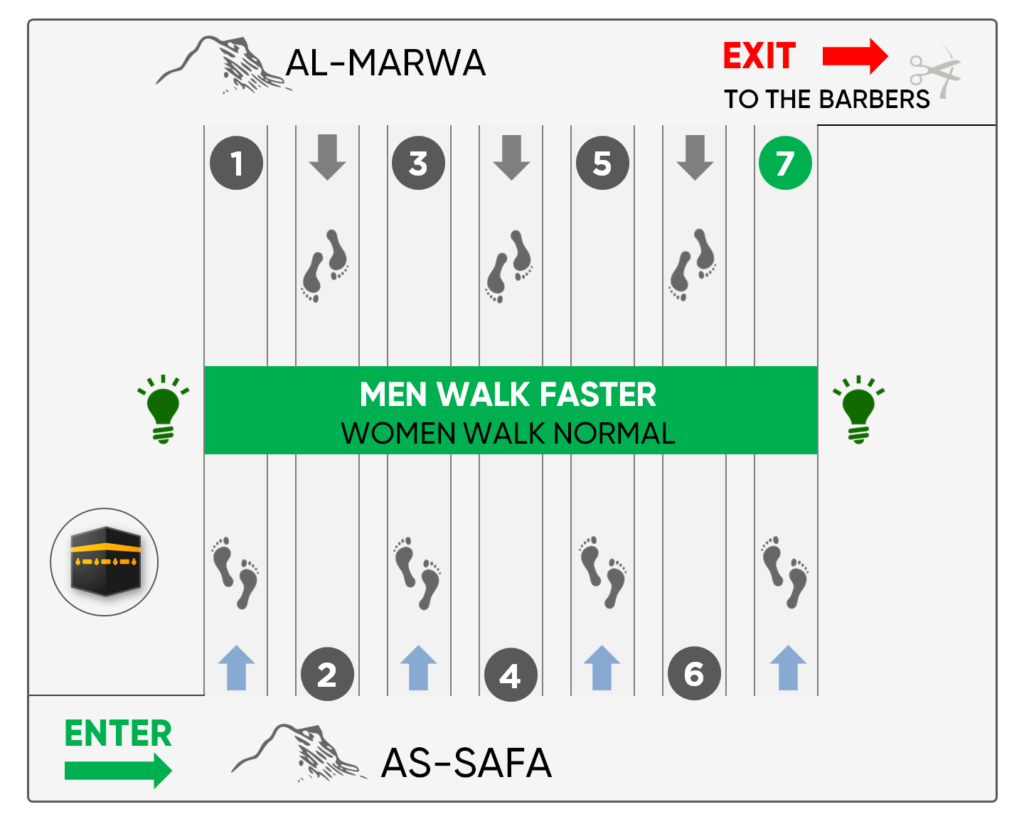
USEFUL UMRAH GUIDES
Here are some useful guides:
Times and Places where Dua is accepted in Umrah and Hajj.
What and When to Supplicate with whilst performing Umrah
Duas for Hajj and Umrah (with English, French and Urdu translation)

AFTER UMRAH
Many people keep doing Umrah after Umrah during their stay in Makkah. It’s allowed to do more than one Umrah in one stay but one has to leave the haram’s limits. However, it is better to stick to the Sunnah and do one Umrah per journey. Please read this article for more information.
Also, those have come to Makkah just to do Umrah and not Hajj are not obliged to do Tawaf Al-Widaa (the farewell tawaf) according to Shaikh Ibn Baz. He points out that this is the more correct of the two opinions (implying that there is a difference of opinion over this). The reason for this is that Umrah can be done at any time (unlike Hajj). Also, there are no reports from the Prophet (sallallahu alaihi wasallam) ordering people to do Tawaf Al-Widaa for Umrah.
However, he points if someone performs Tawaf Al-Widaa then that is good as it is avoiding the disputed matter (i.e. one is being on the safe side). However, it is not obligatory.
Once a person has finished Umrah and all that they need to do (perhaps visit Madinah or fulfill some professional obligations, etc.), one should return home as that is the sunnah.
عَنْ أَبِي هُرَيْرَةَ، أَنَّ رَسُولَ اللَّهِ صلى الله عليه وسلم قَالَ : السَّفَرُ قِطْعَةٌ مِنَ الْعَذَابِ يَمْنَعُ أَحَدَكُمْ نَوْمَهُ وَطَعَامَهُ وَشَرَابَهُ فَإِذَا قَضَى أَحَدُكُمْ نَهْمَتَهُ مِنْ سَفَرِهِ فَلْيُعَجِّلِ الرُّجُوعَ إِلَى أَهْلِهِ
It was narrated from Abu Hurairah (radiallahu anhu) that the Messenger of Allah (sallallahu alaihi wasallam) said: “Traveling is a kind of torment, it keeps anyone of you from his sleep, food and drink. When anyone of you has fulfilled the purpose for which he traveled, let him hasten to return to his family.” [Sunan Ibn Majah, Hadeeth No. 2882. Graded “sahih” (authentic) by Al-Albani.]
However, the person performing Hajj Tamattu should not return back to his country (the place where he lives) in between Hajj and Umrah. Please refer to the following two fatwas:
He did ‘Umrah during the months of Hajj then went back to his city. Is he doing tamattu’?
ACTS WHICH HAVE THE REWARD OF UMRAH
There are some acts which have the reward of Umrah. It does not mean that a person has performed Umrah by doing these deeds, rather it just means that they get an equivalent reward.
1. Praying in Masjid Quba
عَنْ أَبي الأَبْرَد، مَوْلَى بَنِي خَطْمَةَ أَنَّهُ سَمِعَ أُسَيْدَ بْنَ ظُهَيْرٍ الأَنْصَارِيَّ، وَكَانَ مِنْ أَصْحَابِ النَّبِيِّ ـ صلى الله عليه وسلم ـ يُحَدِّثُ عَنِ النَّبِيِّ ـ صلى الله عليه وسلم ـ أَنَّهُ قَالَ
عن سَهْل بْن حُنَيْفٍ قَالَ رَسُولُ اللَّهِ ـ صلى الله عليه وسلم ـ : مَنْ تَطَهَّرَ فِي بَيْتِهِ، ثُمَّ أَتَى مَسْجِدَ قُبَاءٍ، فَصَلَّى فِيهِ صَلاَةً، كَانَ لَهُ كَأَجْرِ عُمْرَةٍ
2. Praying Fajr in congregation, then remembering Allah until the sun has risen and then praying two rakahs
عَنْ أَنَسِ بْنِ مَالِكٍ، قَالَ قَالَ رَسُولُ اللَّهِ صلى الله عليه وسلم : مَنْ صَلَّى الْغَدَاةَ فِي جَمَاعَةٍ ثُمَّ قَعَدَ يَذْكُرُ اللَّهَ حَتَّى تَطْلُعَ الشَّمْسُ ثُمَّ صَلَّى رَكْعَتَيْنِ كَانَتْ لَهُ كَأَجْرِ حَجَّةٍ وَعُمْرَةٍ . قَالَ قَالَ رَسُولُ اللَّهِ صلى الله عليه وسلم : تَامَّةٍ تَامَّةٍ تَامَّةٍ
3. Going out to say the Dhuha prayer
عَنْ أَبِي أُمَامَةَ، أَنَّ رَسُولَ اللَّهِ صلى الله عليه وسلم قَالَ : مَنْ خَرَجَ مِنْ بَيْتِهِ مُتَطَهِّرًا إِلَى صَلاَةٍ مَكْتُوبَةٍ فَأَجْرُهُ كَأَجْرِ الْحَاجِّ الْمُحْرِمِ وَمَنْ خَرَجَ إِلَى تَسْبِيحِ الضُّحَى لاَ يُنْصِبُهُ إِلاَّ إِيَّاهُ فَأَجْرُهُ كَأَجْرِ الْمُعْتَمِرِ وَصَلاَةٌ عَلَى أَثَرِ صَلاَةٍ لاَ لَغْوَ بَيْنَهُمَا كِتَابٌ فِي عِلِّيِّينَ
Shaikh Abdul Mushin Al-Abbaad discussed this hadeeth in his explanation of Sunan Abee Dawood and pointed out that the voluntary prayers are better at home (based on this hadeeth). He pointed out that it could also be an exception only for this prayer. Allah knows Better.
4. Dhikr (remembrance) after the obligatory prayers
عَنْ أَبِي هُرَيْرَةَ ـ رضى الله عنه ـ قَالَ جَاءَ الْفُقَرَاءُ إِلَى النَّبِيِّ صلى الله عليه وسلم فَقَالُوا ذَهَبَ أَهْلُ الدُّثُورِ مِنَ الأَمْوَالِ بِالدَّرَجَاتِ الْعُلاَ وَالنَّعِيمِ الْمُقِيمِ، يُصَلُّونَ كَمَا نُصَلِّي، وَيَصُومُونَ كَمَا نَصُومُ، وَلَهُمْ فَضْلٌ مِنْ أَمْوَالٍ يَحُجُّونَ بِهَا، وَيَعْتَمِرُونَ، وَيُجَاهِدُونَ، وَيَتَصَدَّقُونَ قَالَ : أَلاَ أُحَدِّثُكُمْ بِأَمْرٍ إِنْ أَخَذْتُمْ بِهِ أَدْرَكْتُمْ مَنْ سَبَقَكُمْ وَلَمْ يُدْرِكْكُمْ أَحَدٌ بَعْدَكُمْ، وَكُنْتُمْ خَيْرَ مَنْ أَنْتُمْ بَيْنَ ظَهْرَانَيْهِ، إِلاَّ مَنْ عَمِلَ مِثْلَهُ تُسَبِّحُونَ وَتَحْمَدُونَ، وَتُكَبِّرُونَ خَلْفَ كُلِّ صَلاَةٍ ثَلاَثًا وَثَلاَثِينَ . فَاخْتَلَفْنَا بَيْنَنَا فَقَالَ بَعْضُنَا نُسَبِّحُ ثَلاَثًا وَثَلاَثِينَ، وَنَحْمَدُ ثَلاَثًا وَثَلاَثِينَ، وَنُكَبِّرُ أَرْبَعًا وَثَلاَثِينَ. فَرَجَعْتُ إِلَيْهِ فَقَالَ : تَقُولُ سُبْحَانَ اللَّهِ، وَالْحَمْدُ لِلَّهِ، وَاللَّهُ أَكْبَرُ، حَتَّى يَكُونَ مِنْهُنَّ كُلِّهِنَّ ثَلاَثًا وَثَلاَثِينَ
Narrated Abu Hurairah (radiallahu anhu): Some poor people came to the Prophet (sallallahu alaihi wasallam) and said, “The wealthy people will get higher grades and will have permanent enjoyment and they pray like us and fast as we do. They have more money by which they perform the Hajj, and Umrah; fight and struggle in Allah’s Cause and give in charity.” The Prophet said, “Shall I not tell you a thing upon which if you acted you would catch up with those who have surpassed you? Nobody would overtake you and you would be better than the people amongst whom you live except those who would do the same. Say “Subhan Allah” (glory be to Allah), “Alhamdulillah” (all praise is due to Allah) and “Allahu Akbar”(Allah is Greater) thirty three times each after every (compulsory) prayer.” We differed and some of us said that we should say, “Subhan Allah” thirty three times and “Alhamdulillah” thirty three times and “Allahu Akbar” thirty four times. I went to the Prophet (sallallahu alaihi wasallam) who said, “Say, “SubhanAllah” and “Alhamdulillah” and “Allahu Akbar” all together thirty three times.” [Sahih Al-Bukhari, Volume 1, Hadeeth No. 804]
Please note that this hadeeth does not say that these people get the reward of Umrah, rather what is mentioned is that one can surpass those who do Umrah, Hajj, Jihad and give charity (because they can afford to do so) by remembering Allah (in the manner prescribed in the above hadeeth) after the obligatory prayers.
So, this hadeeth differs from the prior three ahadeeth which clearly state deeds which have the reward of Umrah.
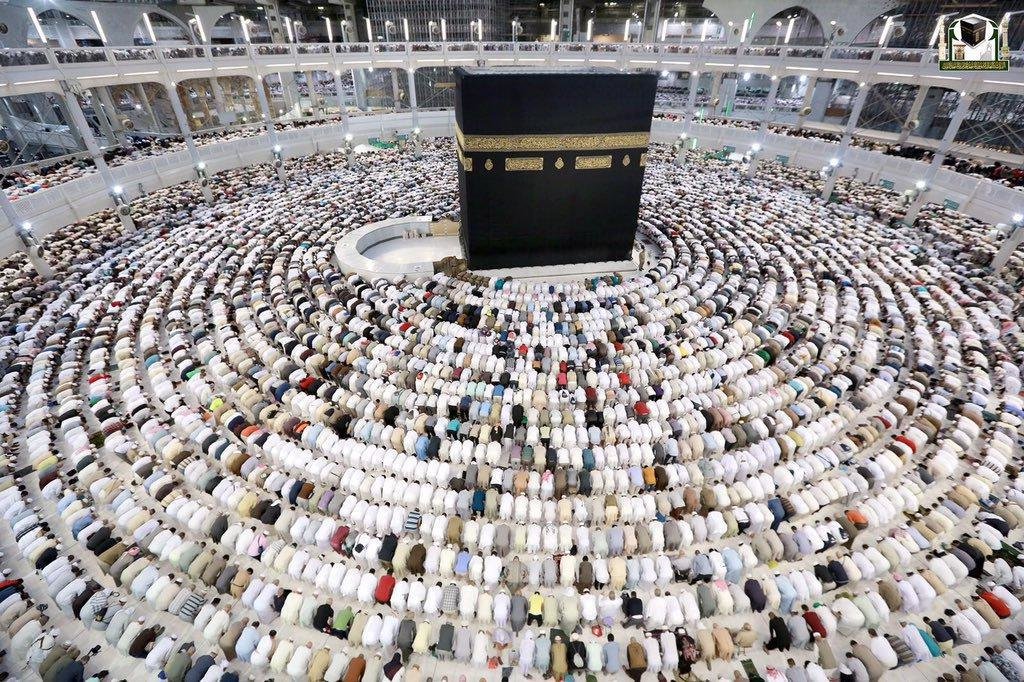
BETWEEN UMRAH AND HAJJ
A person who does Hajj Tamattu is not in ihram between Umrah and Hajj, so he or she is allowed to do the things that are forbidden during ihram. However, a person doing Hajj Qiran is still in ihram at this time, so they cannot do the things forbidden in ihram.
Some people come for Umrah well ahead of Hajj and spend a lot of time in Makkah. Here’s a guide as to how that time can be utilised wisely:
Spending time in Masjid Al-Haram
One should spend time in between Hajj and Umrah increasing in voluntary tawaf, voluntary prayers, dua (supplication) and attending the lectures at Masjid Al-Haram. Here’s an article that discuss what one can do at such times.
Fasting the first ten days of Dhul Hijjah
The days before Hajj are days from Dhul Hijjah and they have many virtues. It is imperative to use them well. Here’s my post on the first ten days of Dhul Hijjah.
Fasting on the first nine days of Dhul Hijjah is highly recommended (as proven in the linked article above). However, as will be mentioned whilst discussing Arafah, it is not recommended for pilgrims to fast on that day, because the Prophet (sallallahu alaihi wasallam) did not fast on the Day of Arafah when he was on Hajj.
What about the first 8 days though? It seems that it is recommended to fast them for those on Hajj as well. However, as the 8th of Dhul Hijjah is the first day of Hajj, and some people become weak due to fasting (and travelling to Mina), it would be better to ask a person of knowledge about one’s situation.
Pondering over the Seerah of the Prophet (sallallahu alaihi wasallam)
It would also be a good idea to read the Seerah (life of the Prophet (sallallahu alaihi wasallam) to realise what he went through in the Makkan era. One might come across some places mentioned in the Seerah whilst in Makkah (or Madinah) and it helps to have read about those places in advance.
Please note that one should not actively seek out those places. You can refer to this article for more information.
[Here’s Part 9.]
